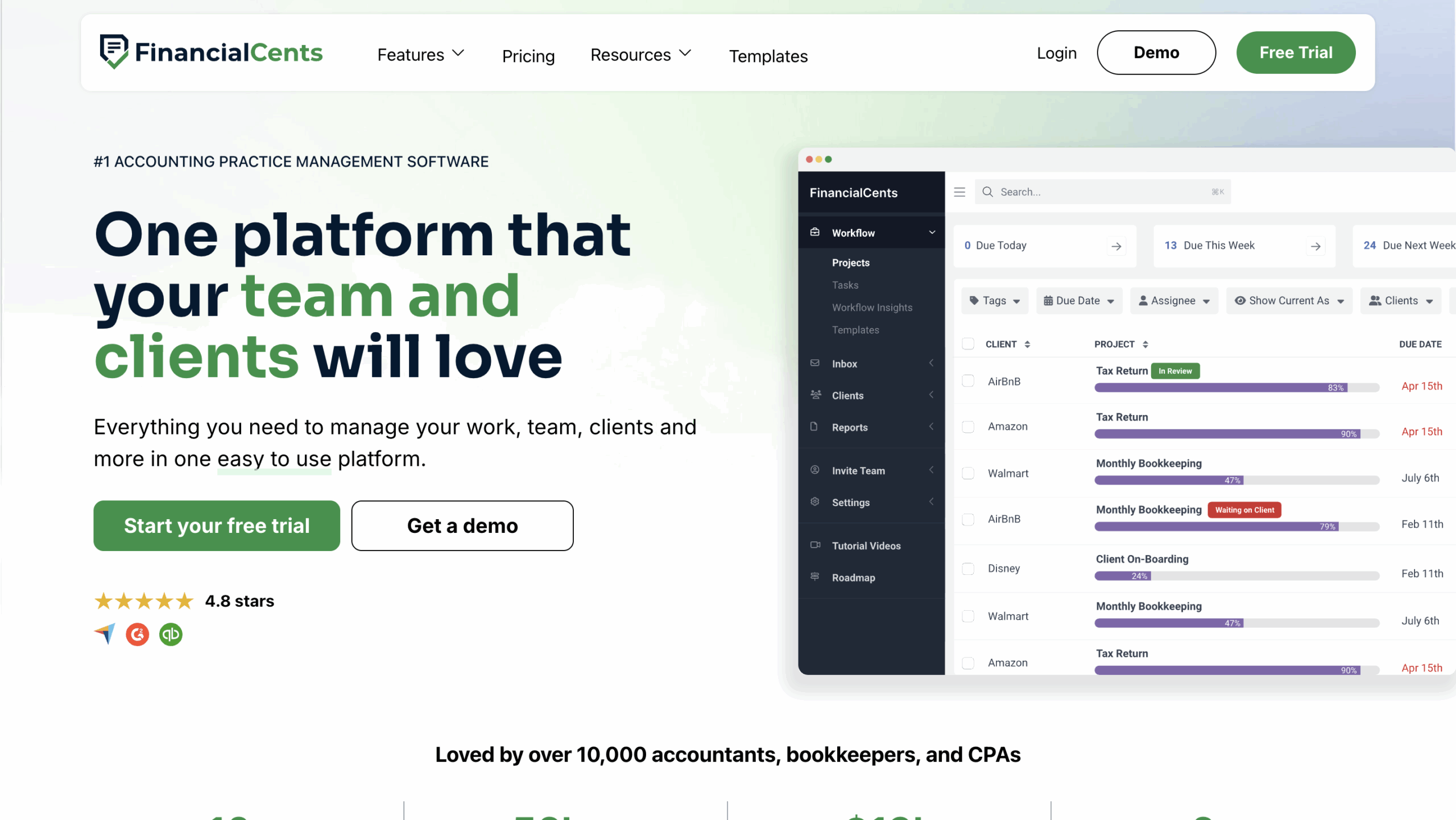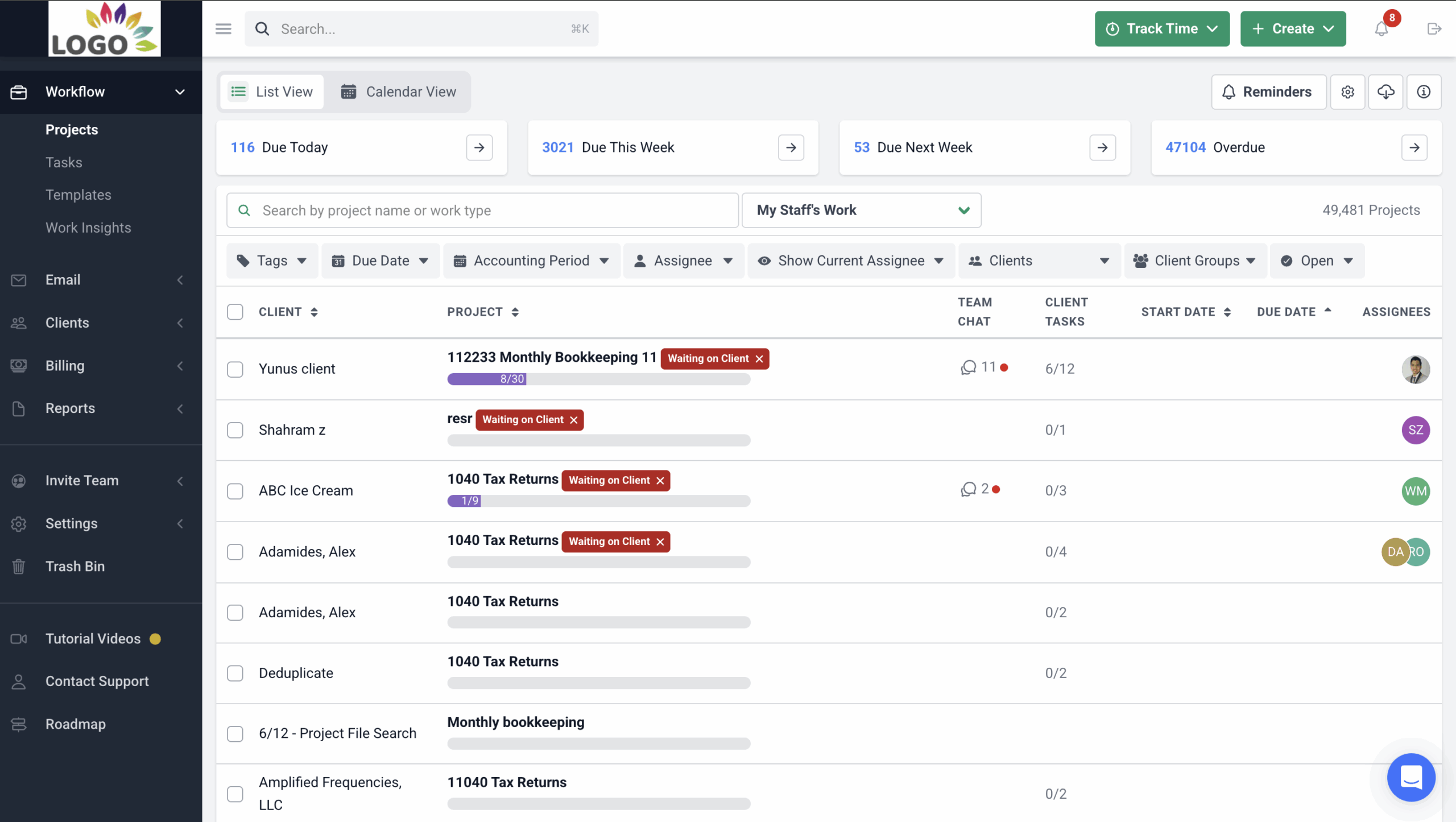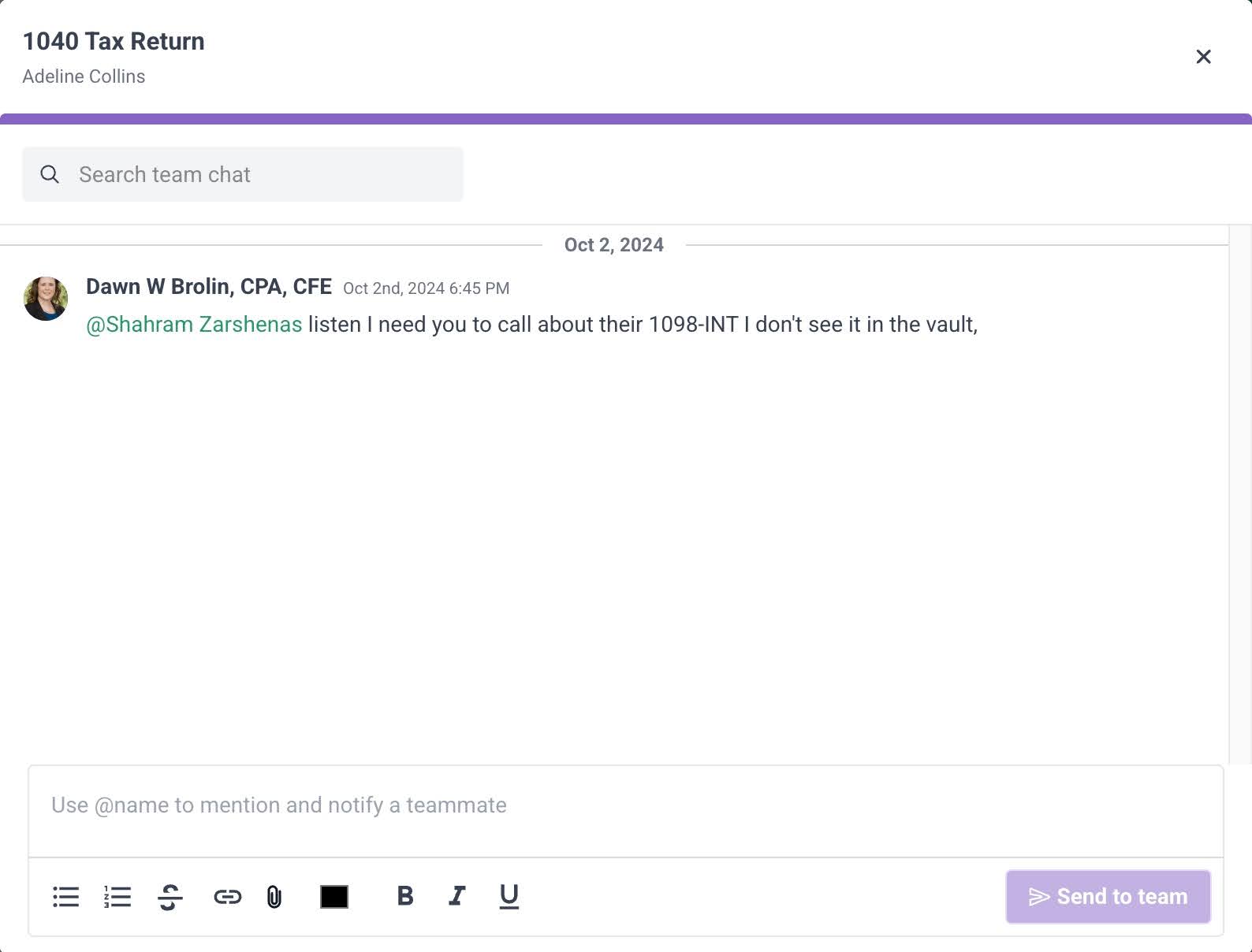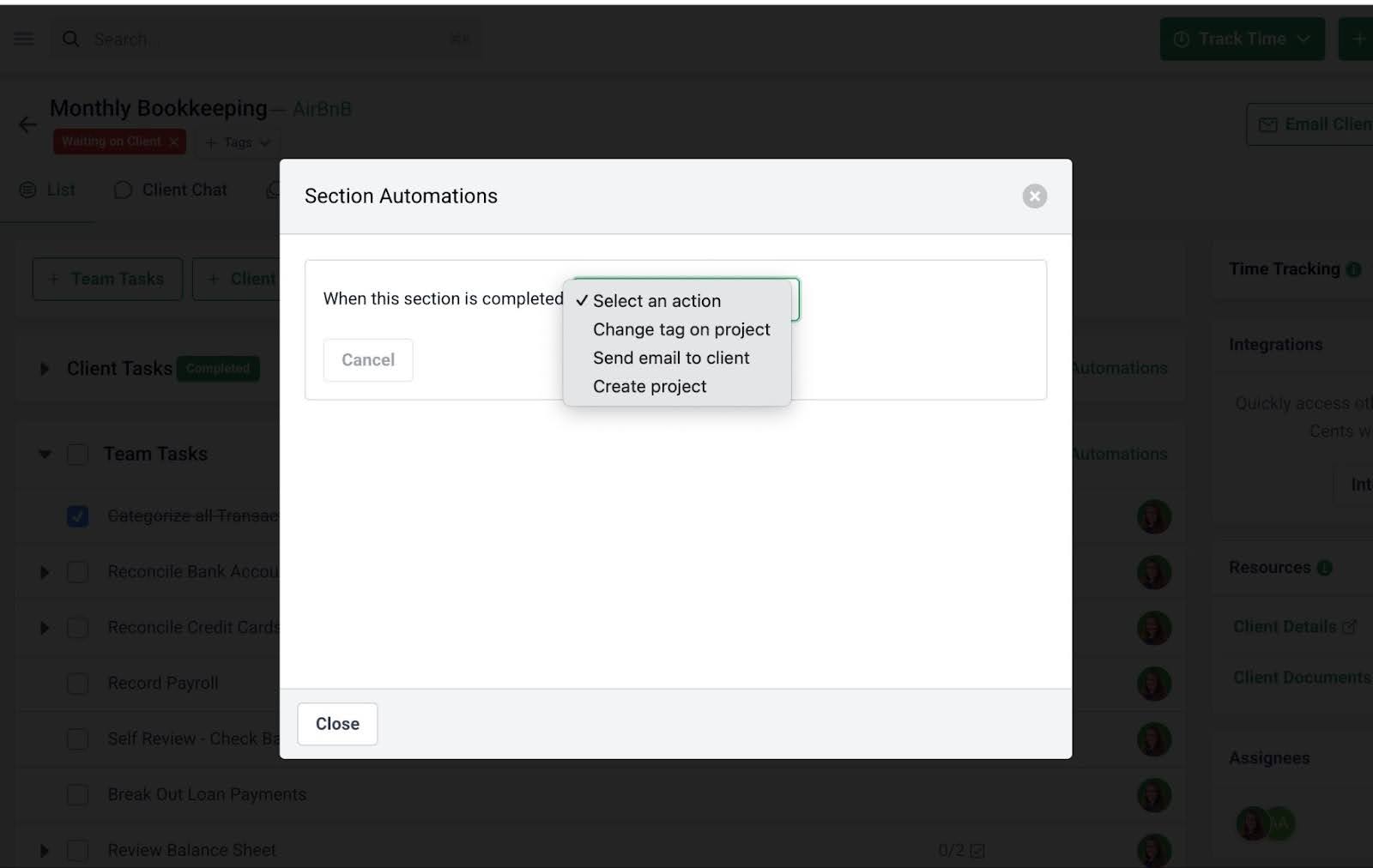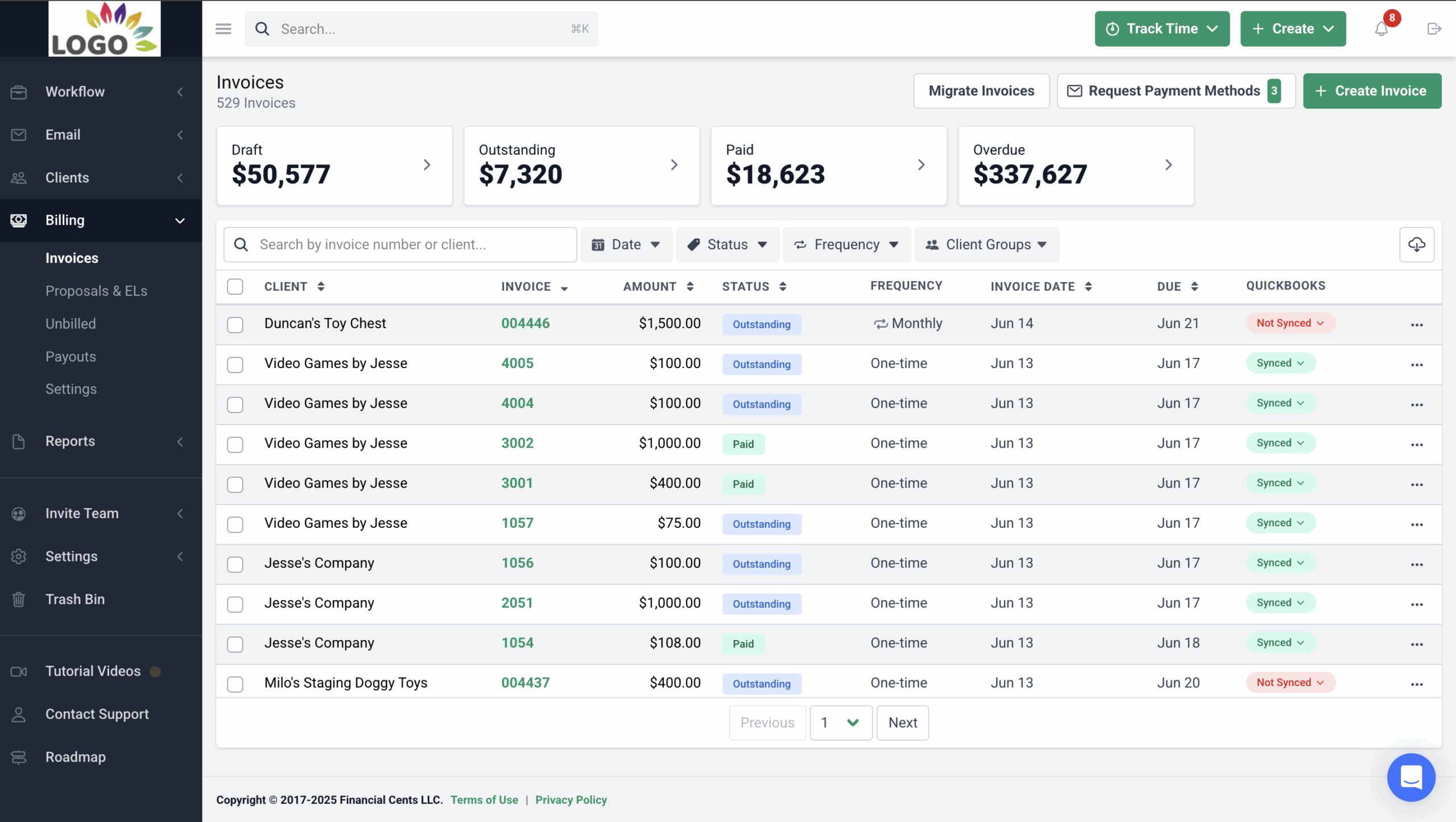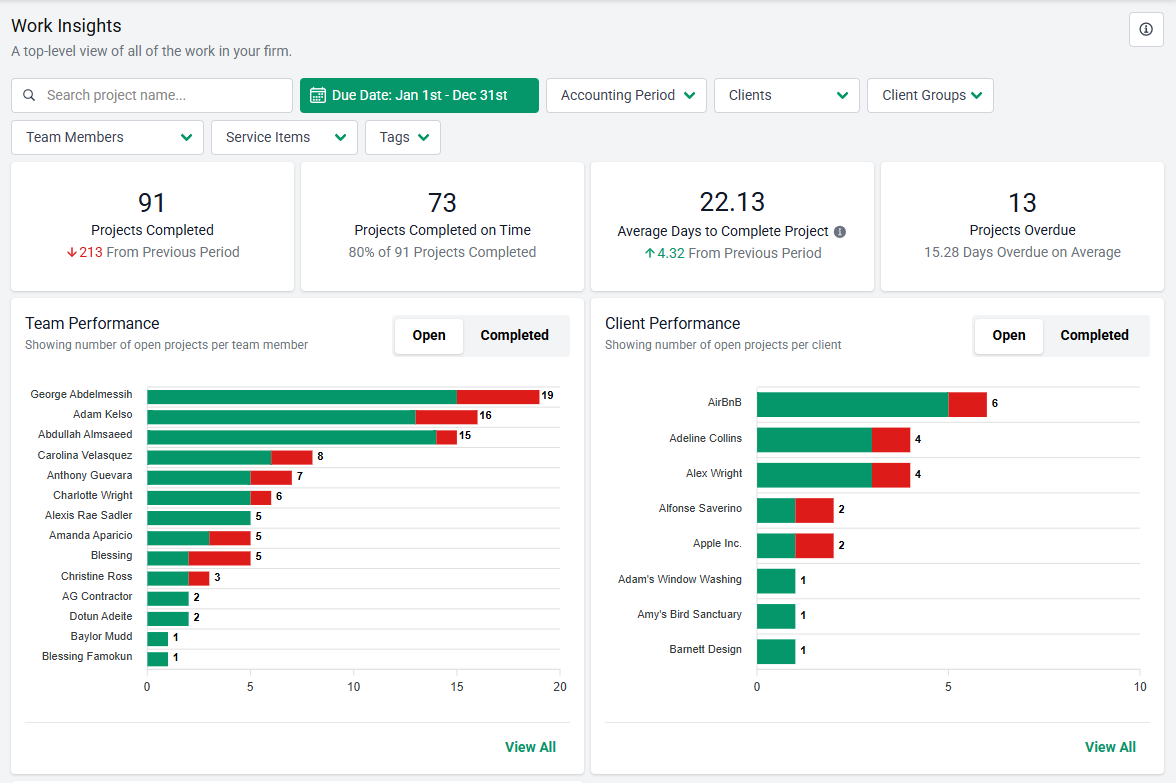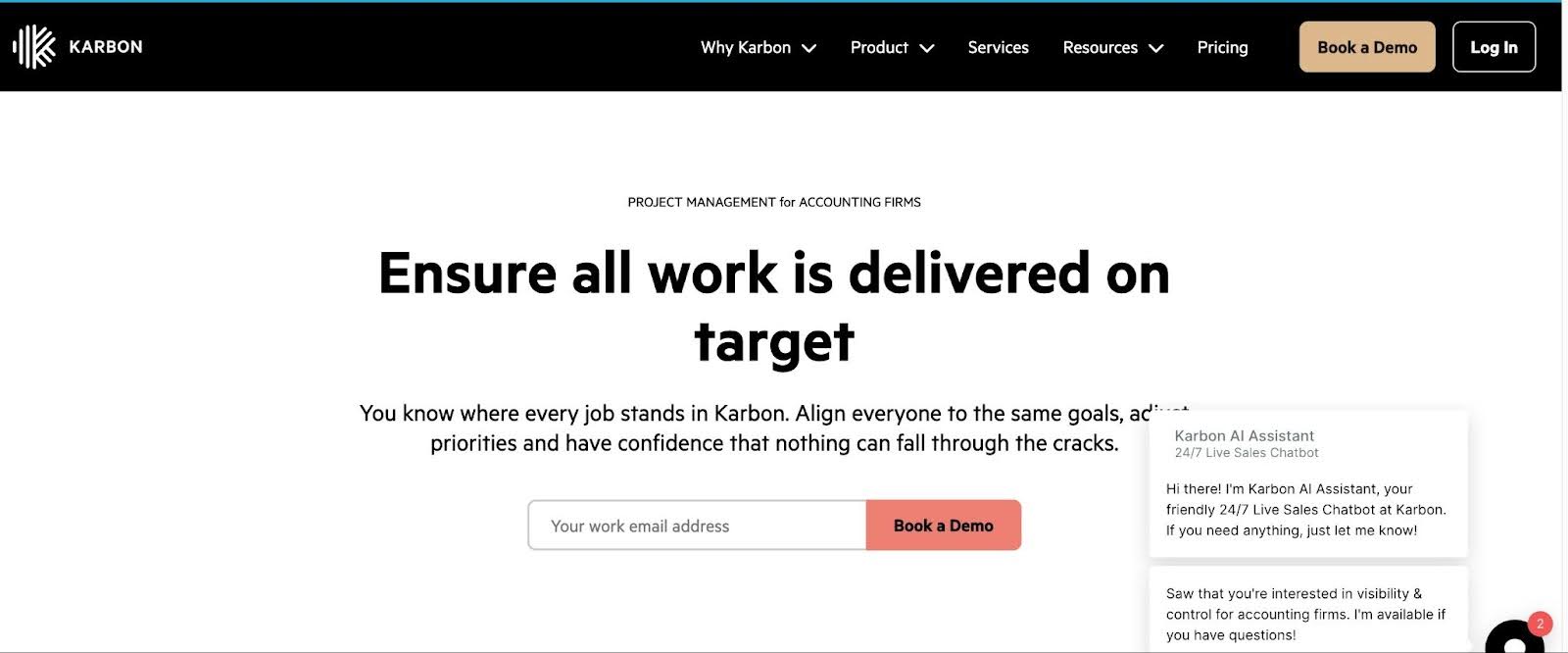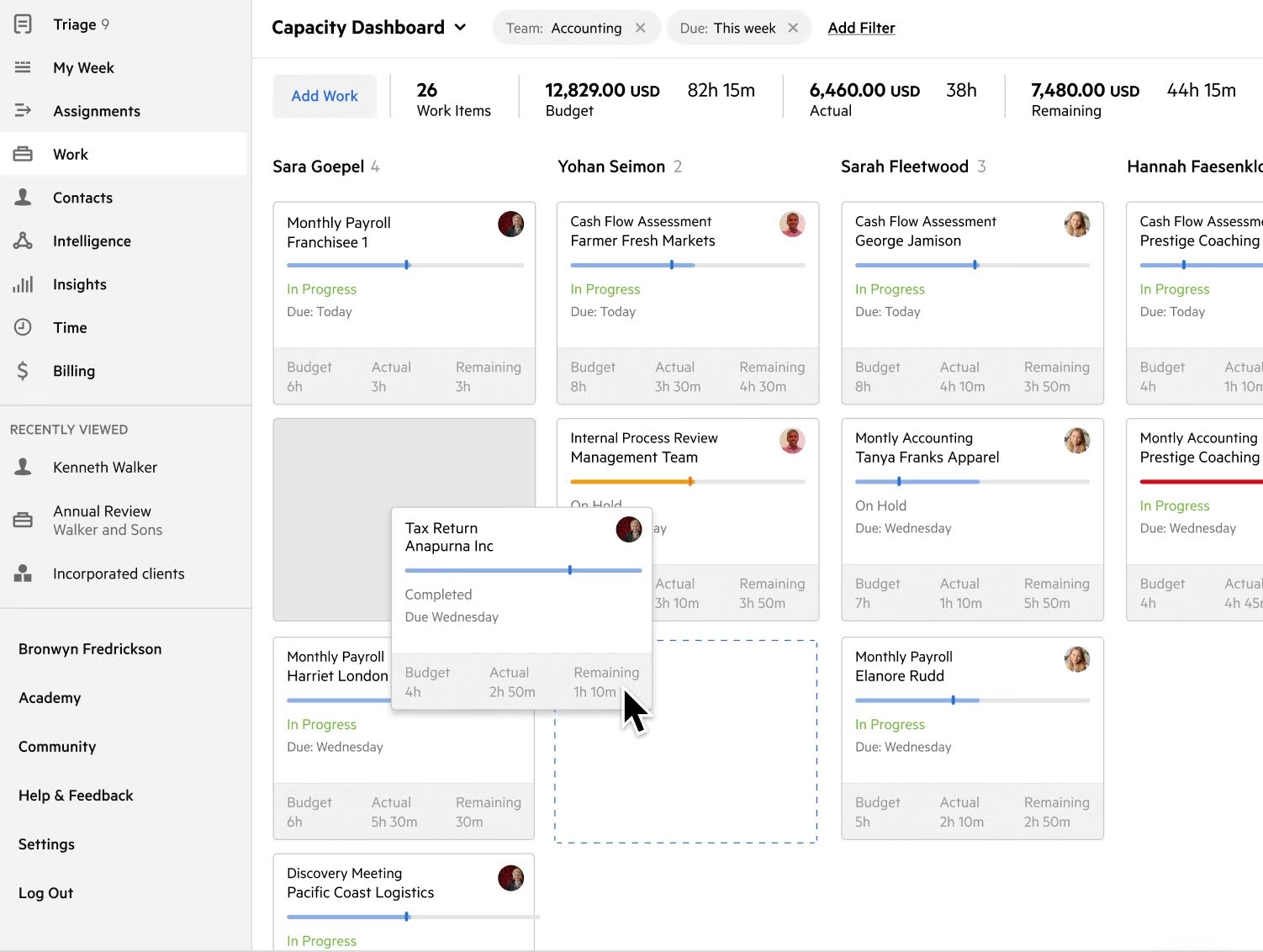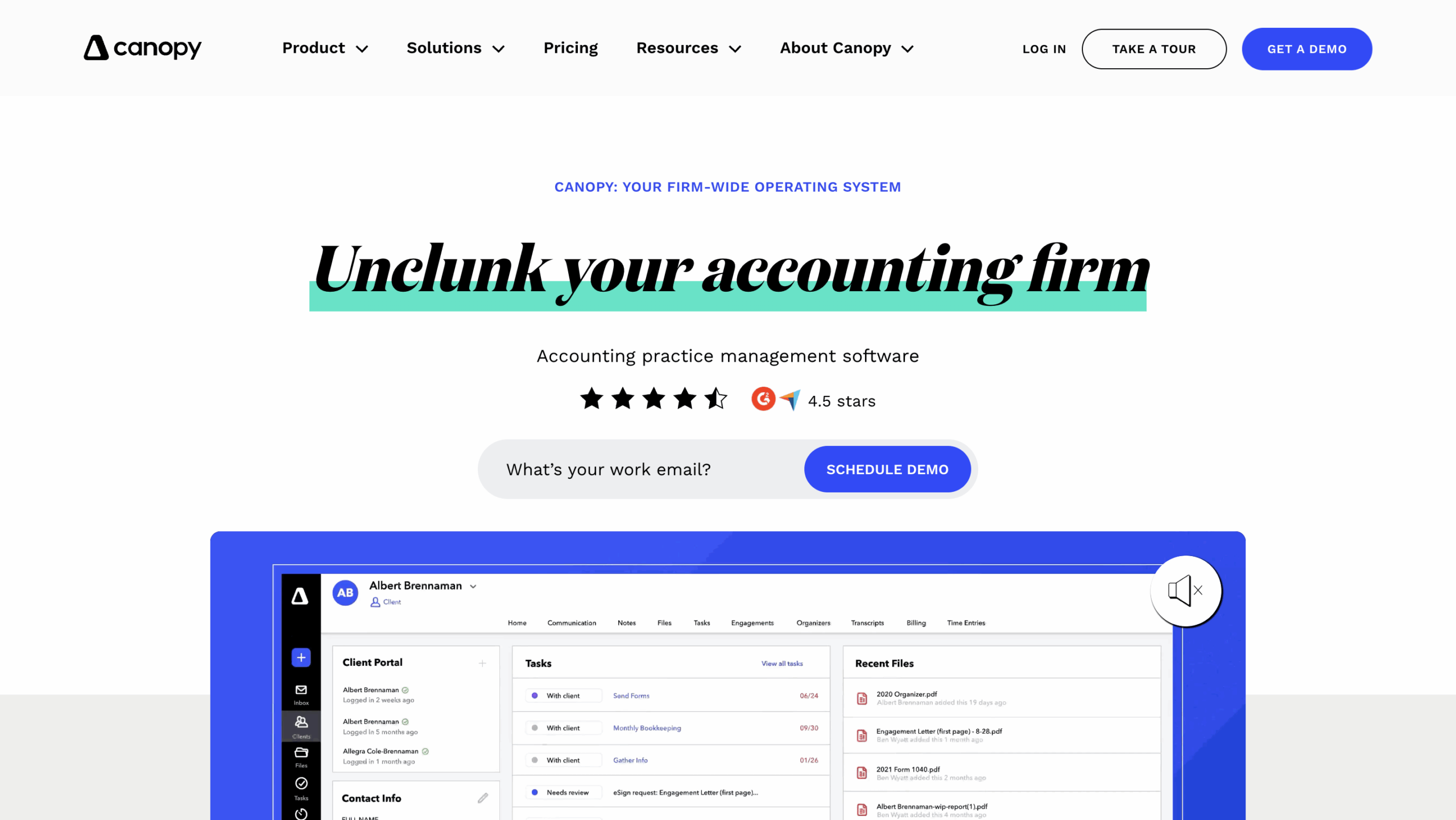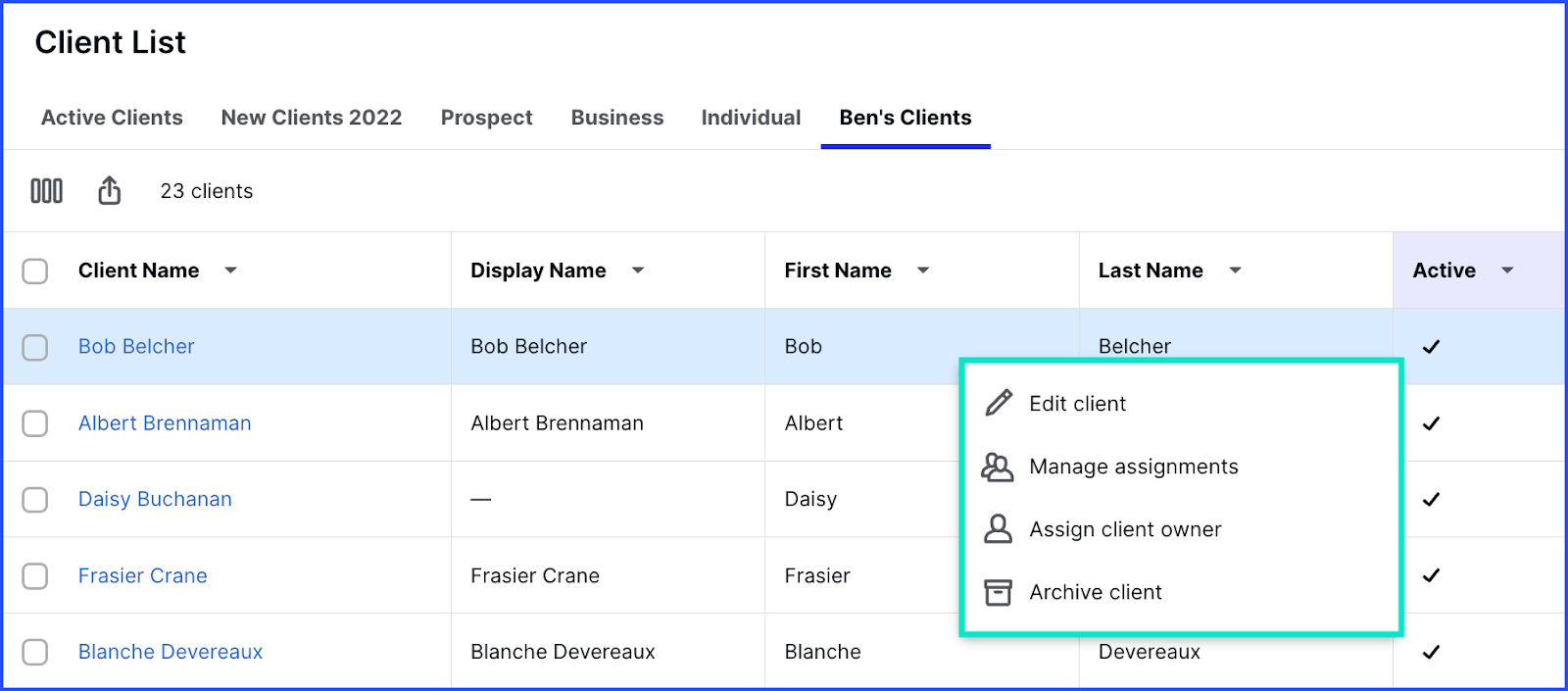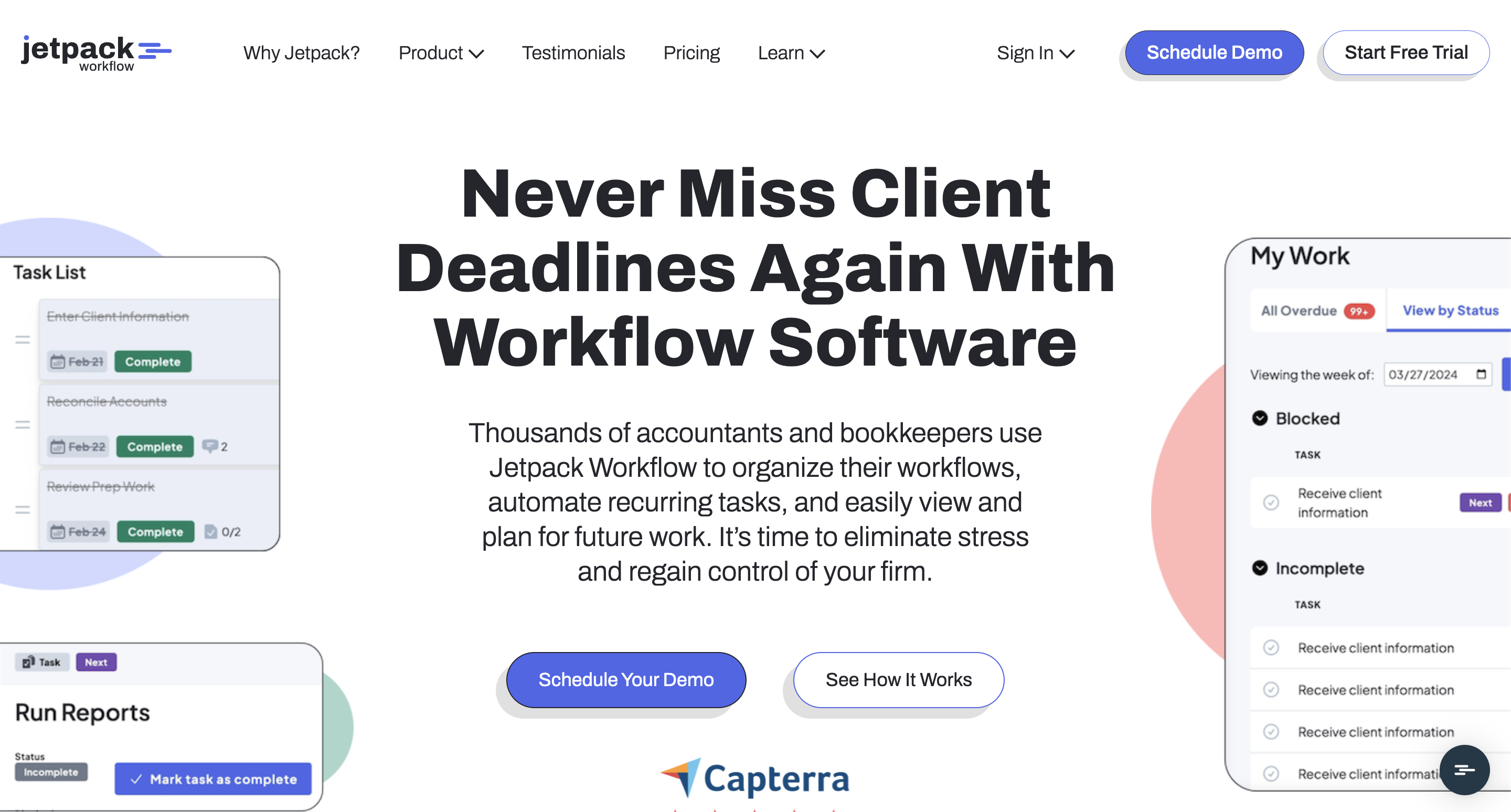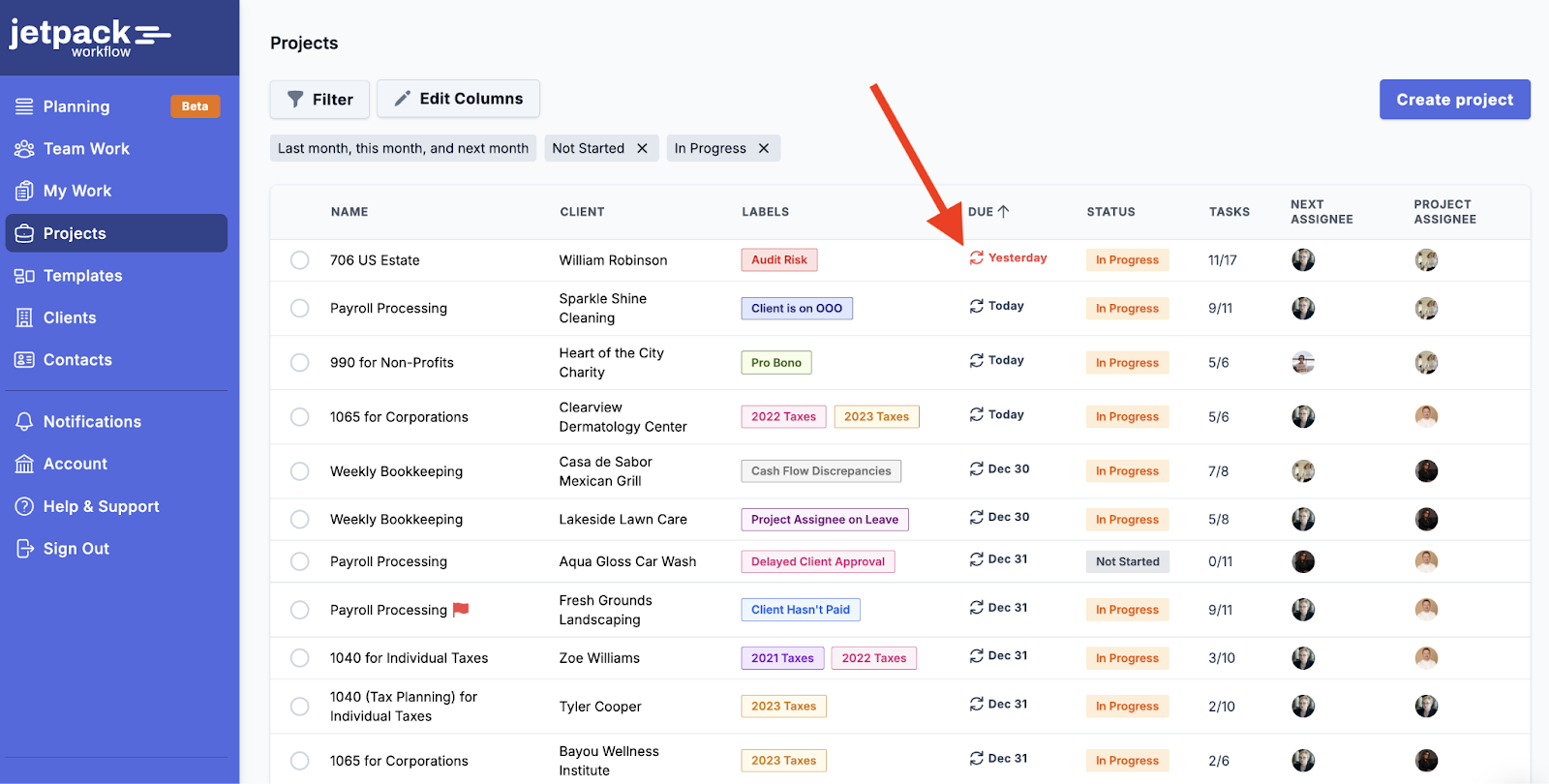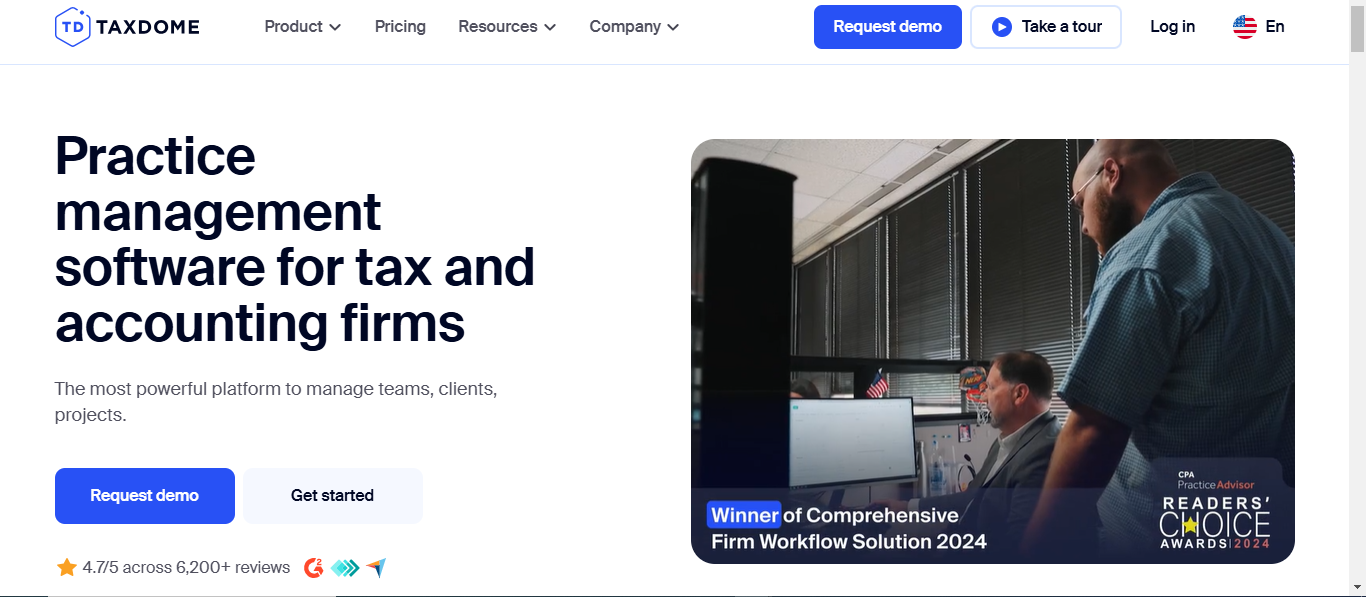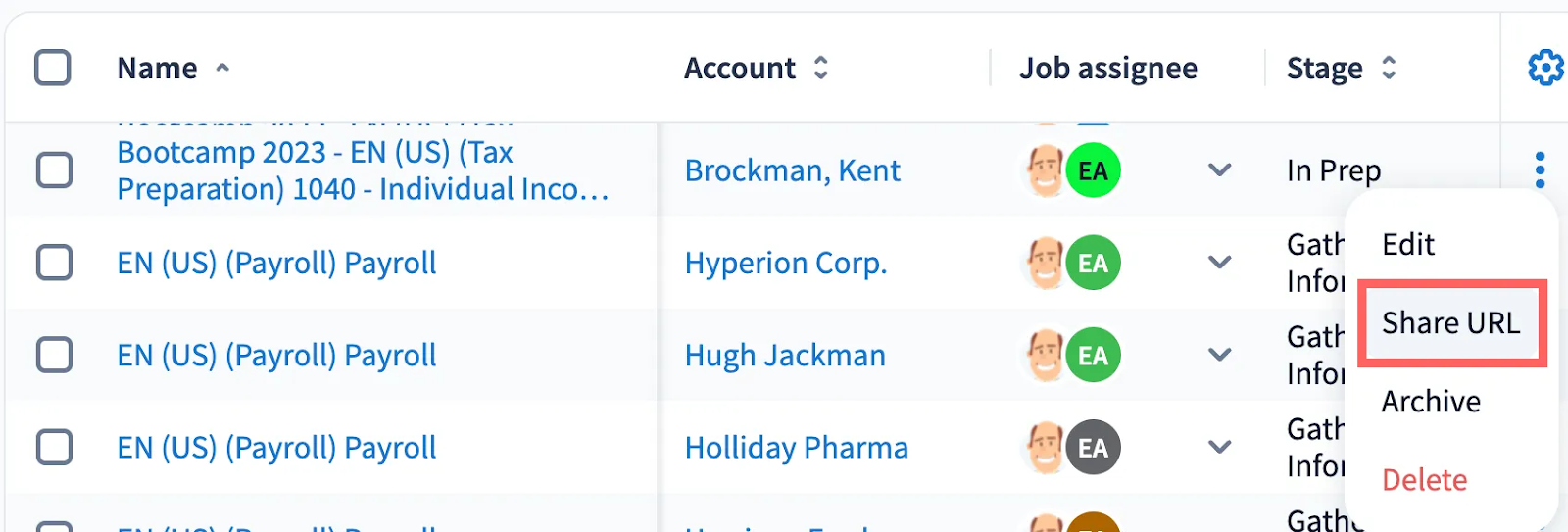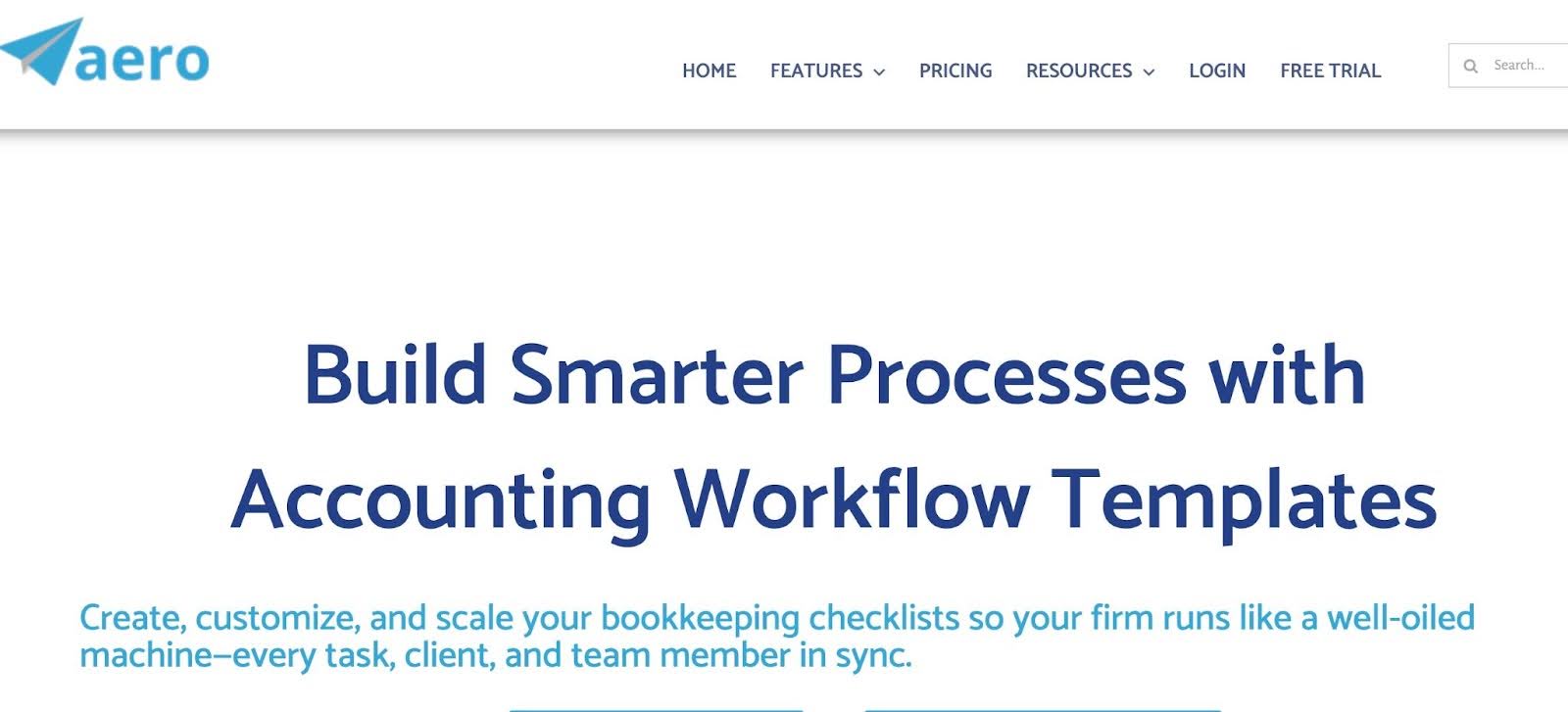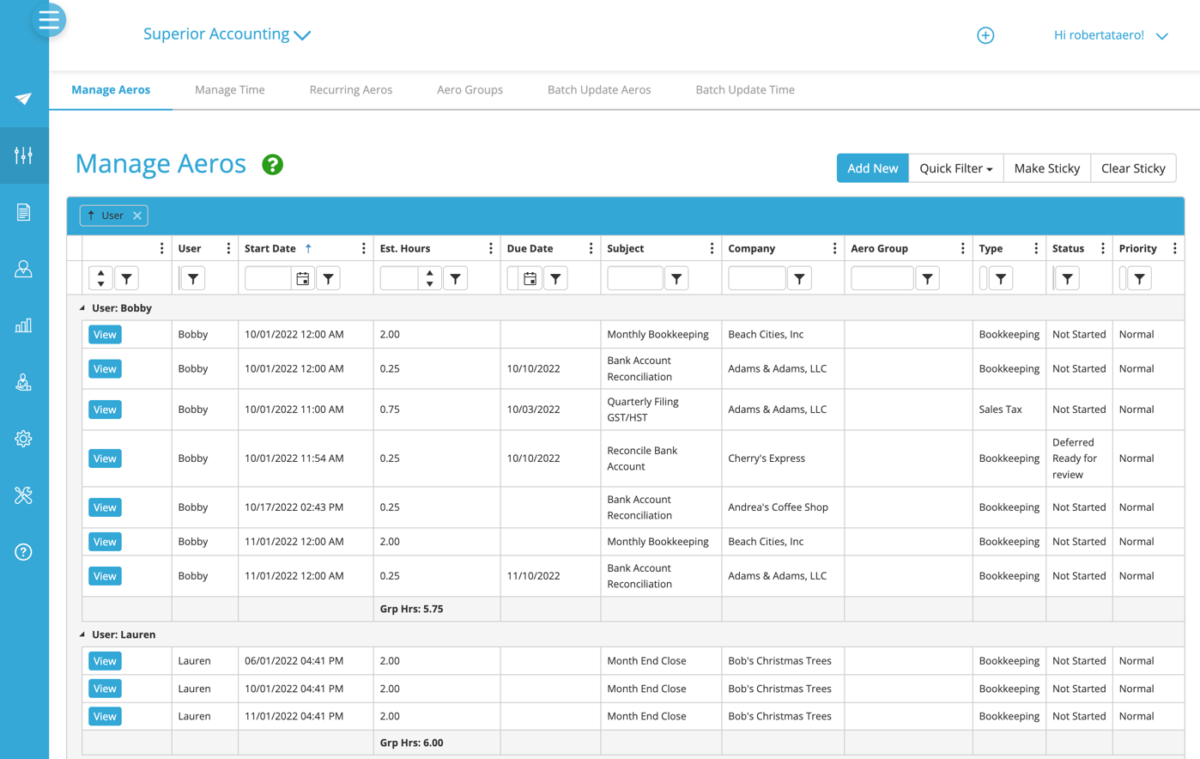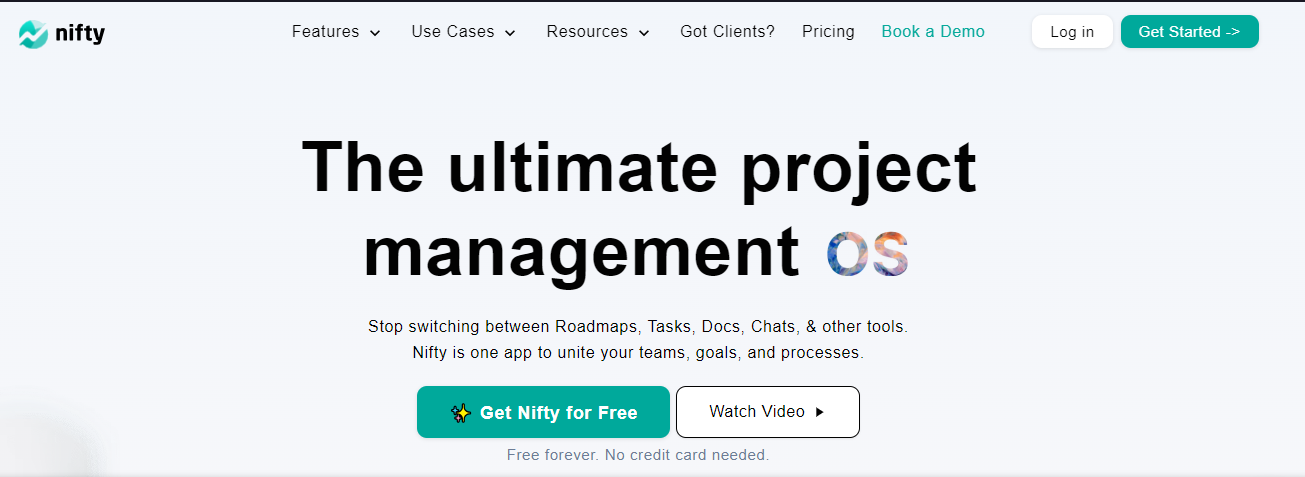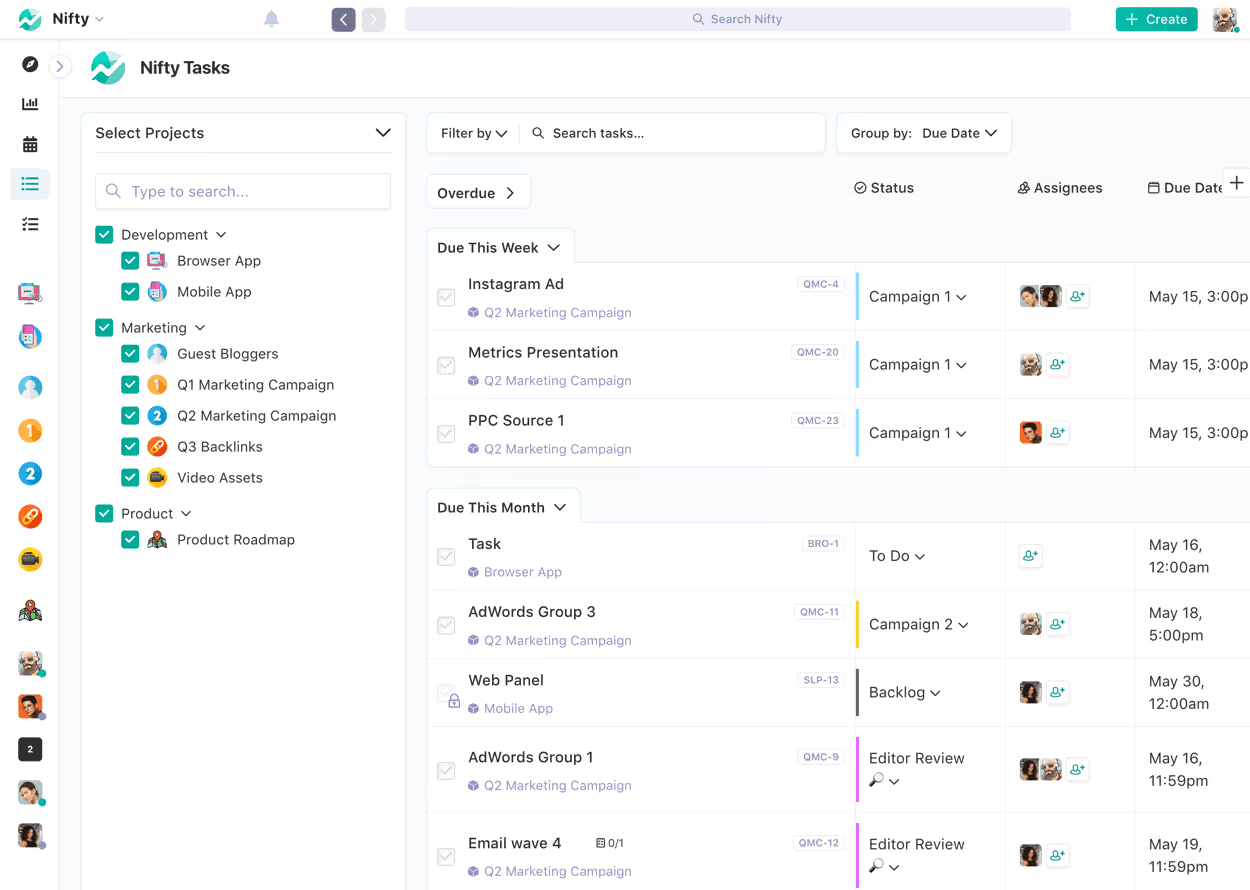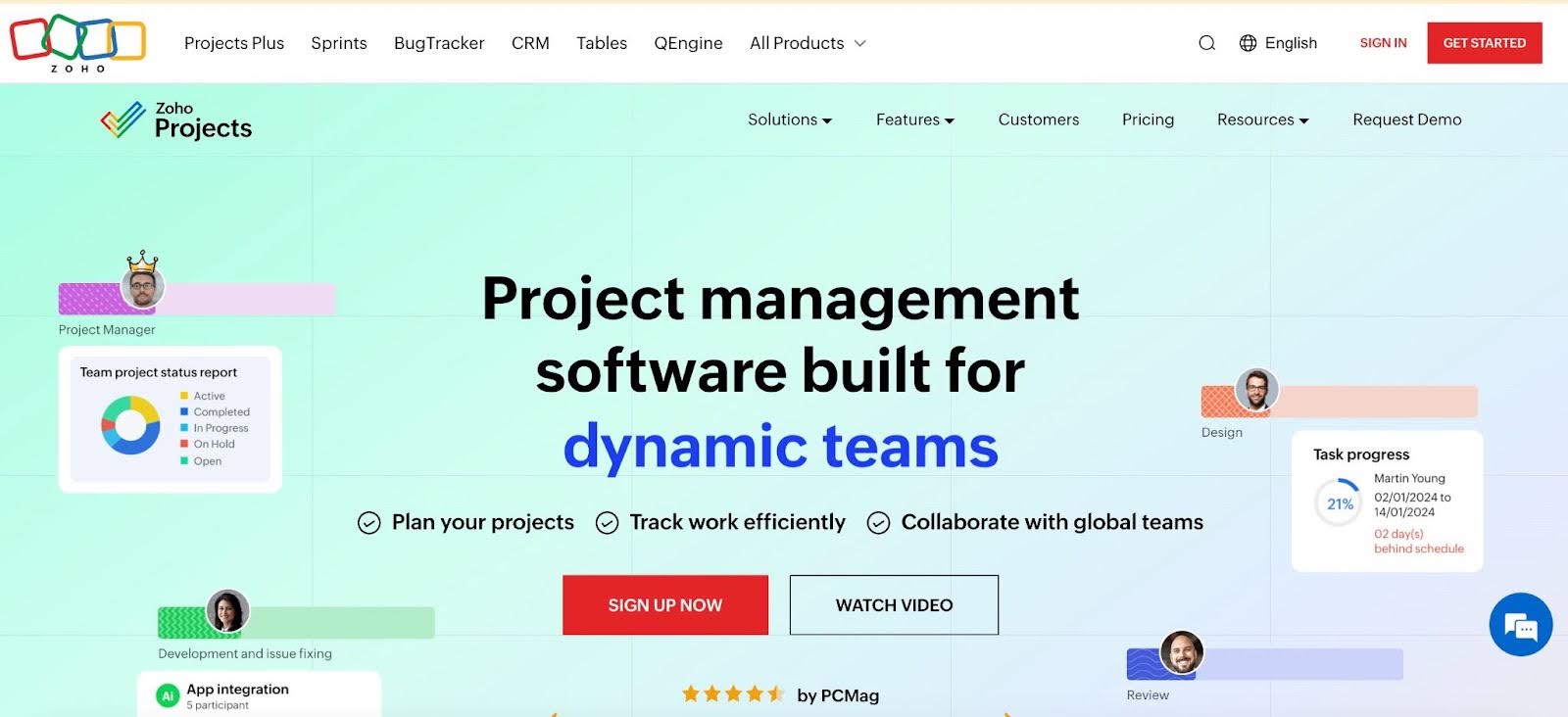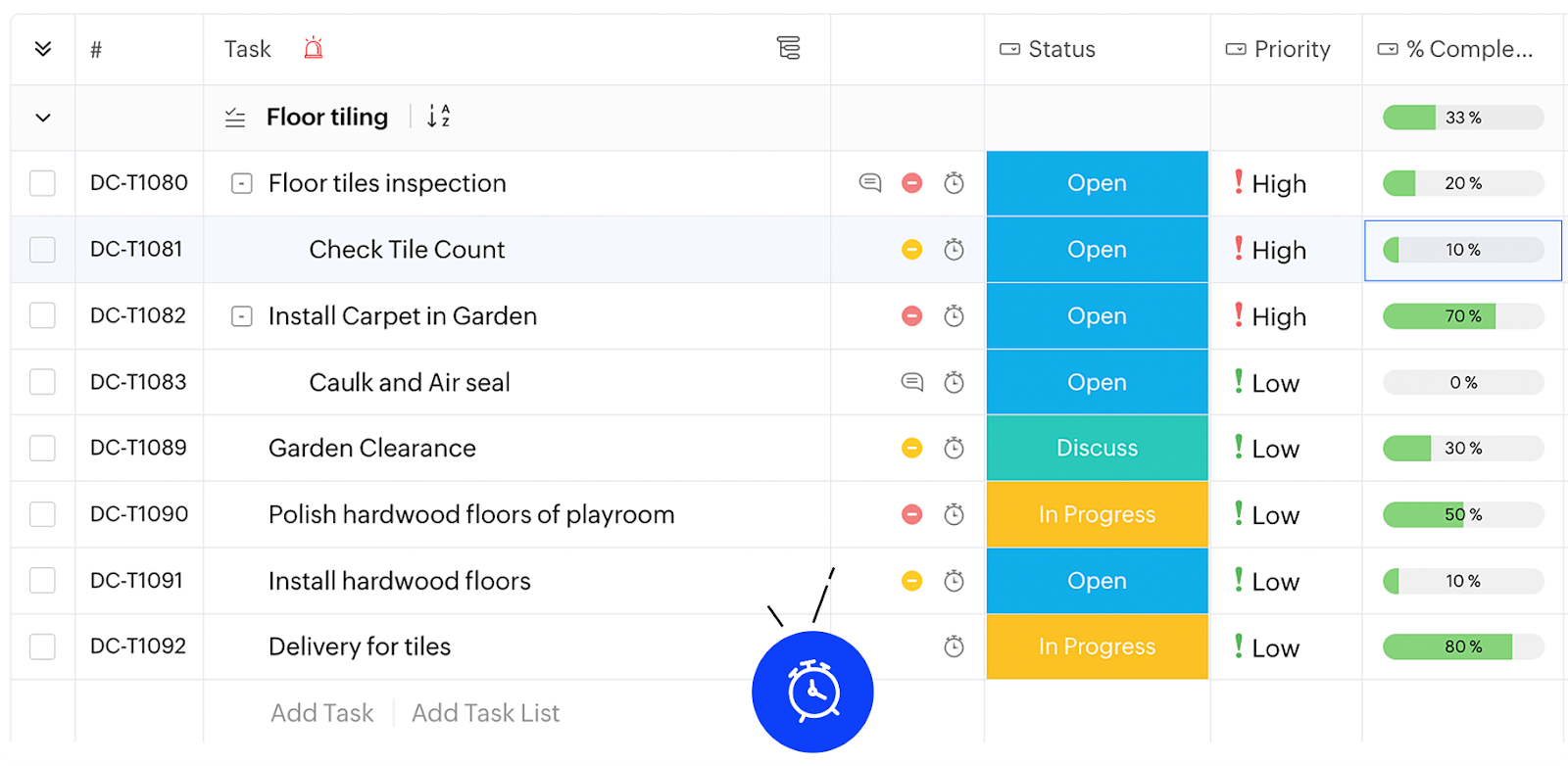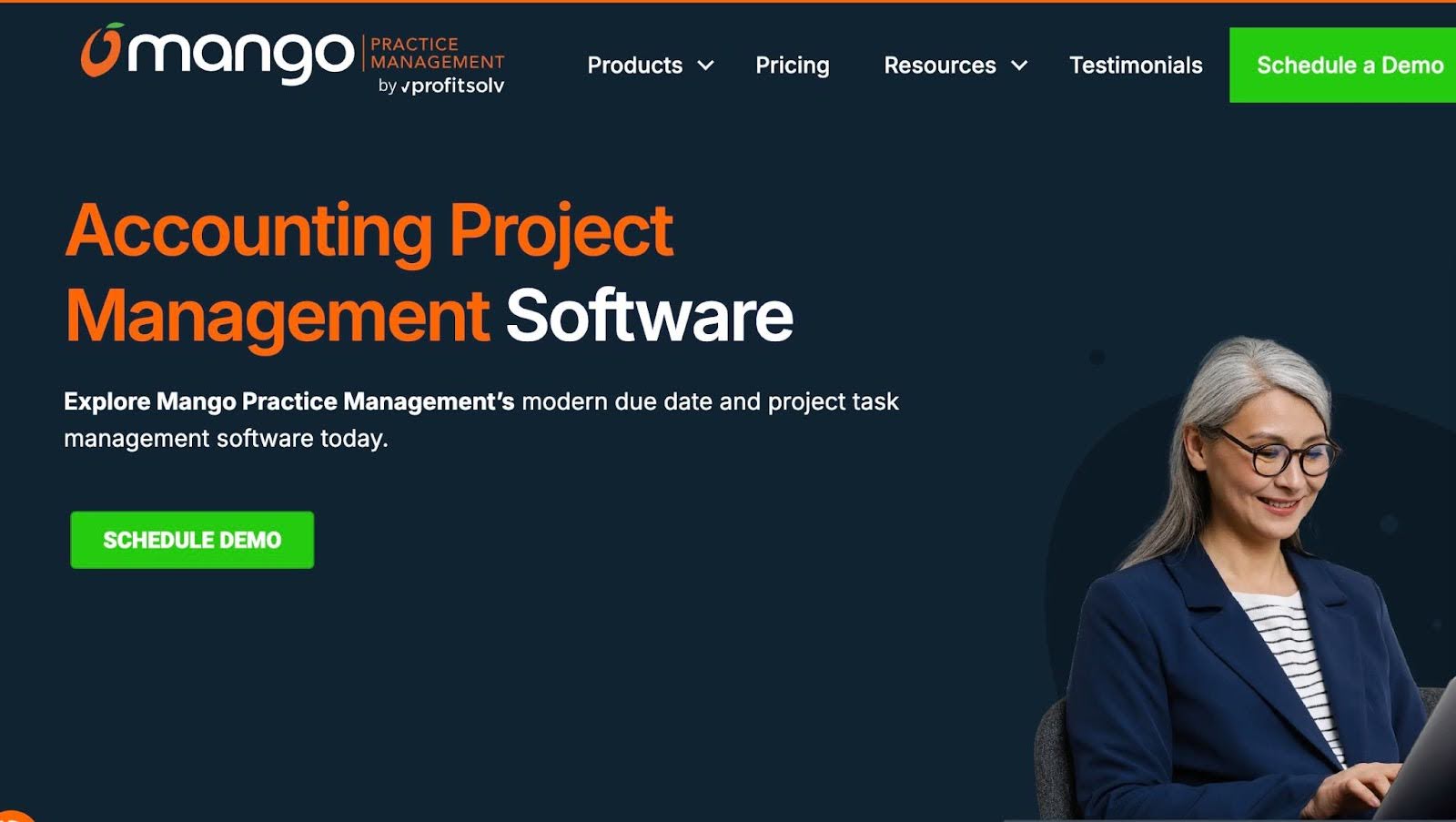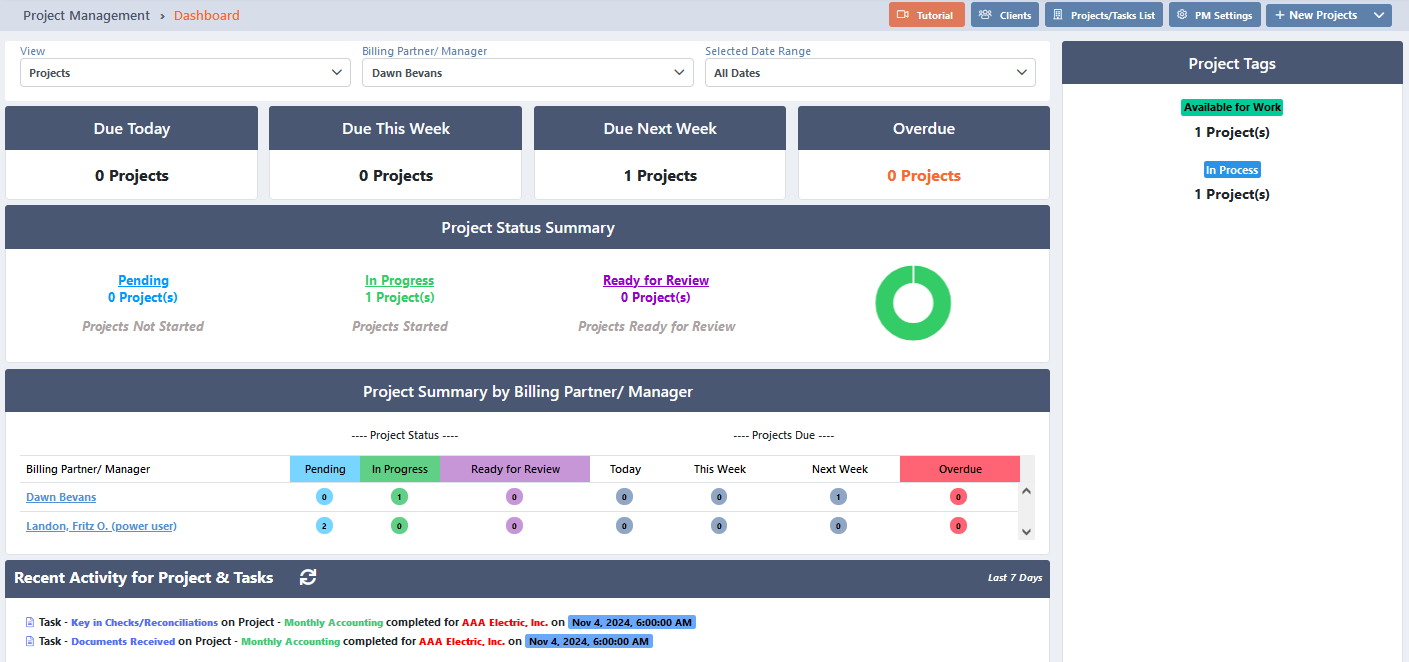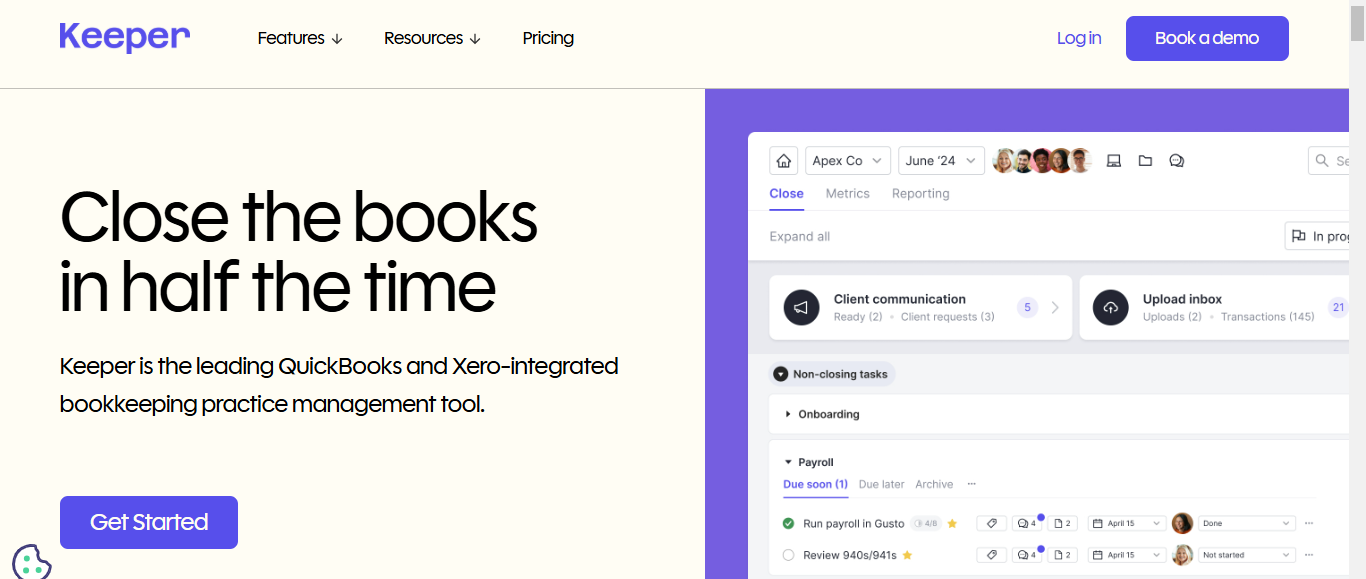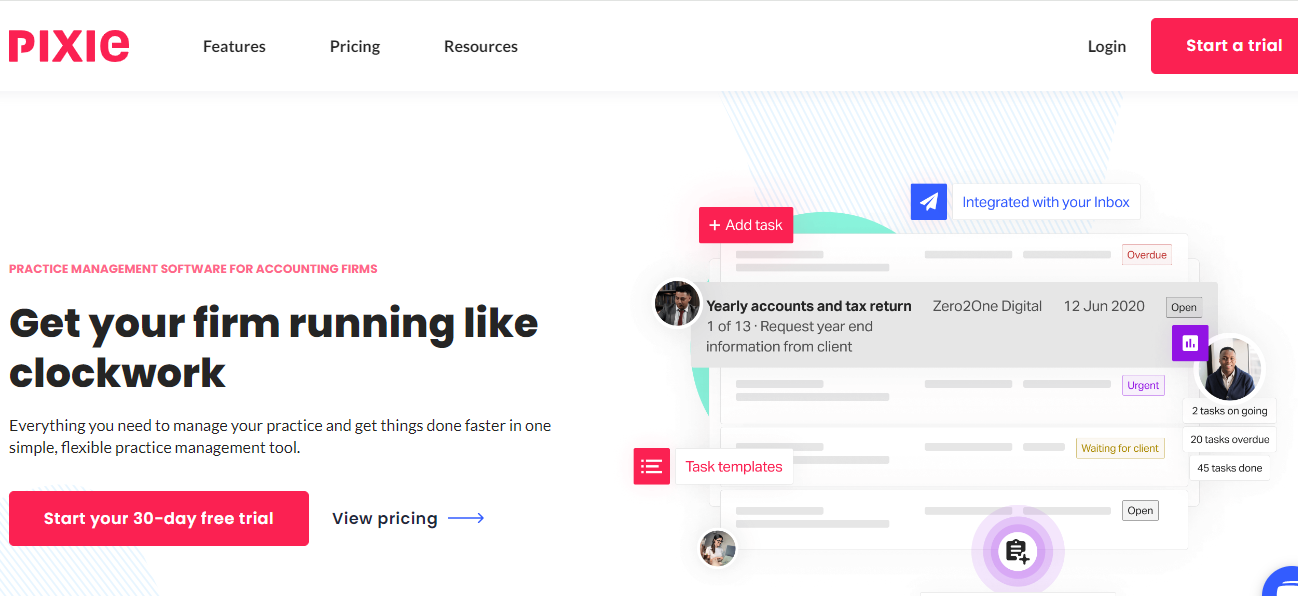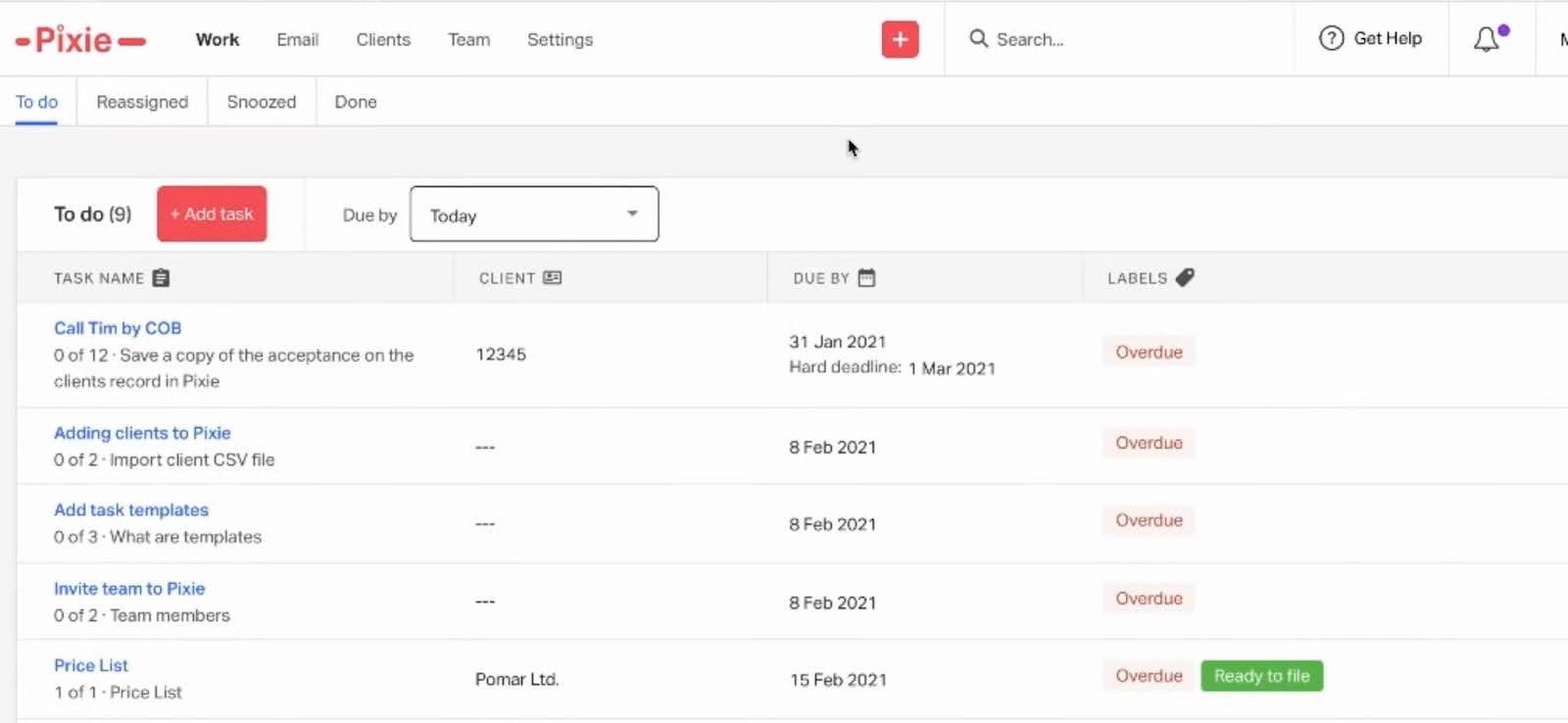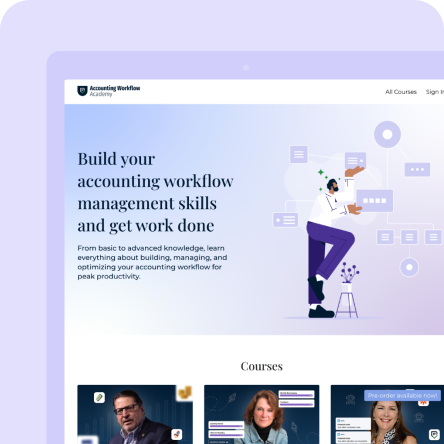We have a lot of projects and staff members, [so our challenge was], ‘how to solve the problem of having multiple irons in the fire and how to keep things structured so we can deliver on what we're trying to do?"
Chris Simons, Partner, Harvey & Simons CPAs, LLCChris’s challenge captures the reality of managing the numerous aspects of accounting projects. That is why every firm owner buys project management software once their team and clients begin to increase.
Unfortunately, many firms end up with the most popular project management software solutions, which were not built with the accountant’s project management needs in mind.
Having the right tool is essential to master accounting project management. While many of these firms have learned to leverage online tools to enhance their daily performance, only a few have found suitable accounting project management software to power their team’s efficiency and client communication.
In this article, we present 11 of the best accounting project management software on the market in 2025. Most were purpose-built for the accounting industry, enabling them to address your existing and emerging project management challenges.
(You may also be interested in: The Best Accounting Practice Management Software Options)
What Is Accounting Project Management Software?
Accounting project management software is a tool that helps accounting firms manage their client work from planning to execution, tracking, and evaluation to ensure resources are spent to maximize efficiency and profitability.
You can learn more about essential features an accounting project management system should have in this blog.
How Accounting Project Management Differs from Generic Project Management Tools
Generic project management software is designed for professionals in diverse fields (accounting could be one of them), but an accounting project management tool is built exclusively for the project management needs of the accounting industry (including bookkeeping and tax).
Typically, the system tailors traditional project management features into the specific context of accounting workflows, making it more useful to accounting professionals.
That’s why they’re more useful for:
-
Organizing recurring workflows
They enable you to create projects once and make them automatically repeat, which reduces your manual workload and keeps the projects from being forgotten.
-
Handling client requests
Project management tool for accounting handles document and information requests by allowing you to create a checklist of the information you need from your clients.
It combines with the auto-reminder feature to follow up with clients, ensuring they don’t forget your requests.
-
Improving team productivity
Accounting firm project management software provides a dashboard that keeps all team members on the same page, clarifying priorities, responsibilities, and deadlines.
This saves accounting teams the time they’d have wasted on time-consuming, but administratively important, tasks.
Must-Have Features in a Project Management Software
-
Task Management and Progress Tracking
The task management and progress tracking feature helps team members understand what they are responsible for while enabling you, the firm owner, to monitor progress and hold your team members accountable to deadlines.
-
Workflow Templates
Accounting workflow templates help your entire team understand what is required to complete a project or task, which makes for consistent work quality.
Plus, the ability to create projects from templates saves your team from the error of forgetting key steps in a project.
-
Time Tracking & Billing
Time tracking has numerous benefits, such as understanding where your team spends their time, measuring which client is taking too much of your time, and the time your team spends on projects versus the time budgeted.
With the accounting billing feature, you enjoy the benefit of having your time and billing in one app, which saves you from manual data entry and makes your billing more accurate.
-
Team Collaboration
The team communication feature not only speeds up team collaboration but also centralizes it.
It prevents information silos (which is common with email), reduces the time team members spend looking for information in email threads, and puts everyone involved in a project on the same page at all times to complete their tasks efficiently.
-
Workflow Automation
The workflow automation feature frees your team from spending their time and mental energy on those manual tasks that you can’t bill clients for.
From creating recurring projects to managing task dependencies and client follow-up, workflow automation handles them even better than humans.
-
Client Management
Securely storing your client’s information and effectively communicating (and collaborating) with clients is crucial to delivering work that meets their satisfaction.
The client management feature brings your client documents, projects, and communication into one place, making it easier and more convenient for clients to work with your team. It also helps your team find the information they need to meet client expectations. Learn why your project management software should have a CRM.
-
Integration with Accounting Software
Using the example of Financial Cents and QuickBooks Online, integration saves your team the need to enter data multiple times or log into all the tools you use for work individually.
Financial Cents’ billing features (among other Financial Cents features) synchronize with QBO in a way that reflects every action taken on an invoice in Financial Cents inside QBO.
-
Capacity Management
If you can’t see who is overworked in your firm, you might end up assigning them more tasks, which will negatively impact the accuracy of their work and result in employee burnout.
Meanwhile, some other team members may not be handling enough work to justify your investment in them.
The capacity management feature shows you how much work each team member has on their plate, so you can balance workload and get maximum return on investment in your employees.
-
Reporting & Team Performance Dashboards
The reporting feature gives you the data to understand what your team is getting right and where you may be missing it.
The Financial Cents’ utilization report, for example, shows you how much time your team is spending on billable versus non-billable work. This gives you the information you need for effective decision-making.
The 11 Top Accounting Firm Project Management Tools in 2025
1. Financial Cents
Financial Cents is an all-in-one accounting practice management software with an easy-to-use project management solution.
Its project management features give accounting firm owners and managers complete visibility into their workflows while automating repetitive tasks and centralizing team and client collaboration to make firms more organized, efficient, and productive.
Its project management features include:
Task Management
- Workflow Dashboard: The workflow dashboard provides a firmwide view of all projects in your firm, showing their due dates, status, and assignees.
- Workflow Filters: lets you zero in on specific project information at any given moment using a range of filters (such as the search bar, assignee, due date, tags, and client).
- Templates: Pre-built SOPs guide your team, showing what to do at each stage. You also get access to over 200 workflow templates created by other accounting, bookkeeping and tax professionals like yourself.
- AI Workflow: generate workflow checklists within seconds using AI.
Team Collaboration
- Comments: Team members can communicate within tasks for clarity and support.
- Team Chat: All project communication is centralized within each project.
- @Mentions: Tag teammates directly to pull them into specific discussions.
- Activity tab: shows who last interacted with a client and what was discussed.
Automation
- Automatic Client Email Update: Notify clients automatically when a task or section is completed, telling them what to do next.
- Project Auto-Creation: triggers a new project in the workflow dashboard when a task or section is completed.
- Client Tasks & Reminders: Automate reminders to clients for document uploads, information requests, or e-signatures.
- Due Date Reminder: notify your team members about their upcoming due dates.
- Tag Automation: predefined labels that automatically update project status.
- Dependencies: coordinates projects by ensuring tasks are not actionable until preceding steps are completed.
Recurring Projects
Financial Cents’ recurring projects feature saves you the trouble of recreating your regular projects every single time, using:
- Default Schedule: daily, weekly, monthly, quarterly, or annually.
- Custom Schedule: (e.g., last day of the month, first Friday, every second Tuesday, etc.)
Client Management
- Client Database: a bird’s-eye view of all client records in one place.
- Client Profile: detailed client information centralized in one place. Information includes:
- Projects: all ongoing work for the client.
- Client Notes: Project-critical information is stored in their profile.
- Recent Documents: secure and centralized storage for client documents.
- Client Tasks: Monitor all pending client requests.
- Activity Timeline: A full record of client interactions—who did what, when, and why.
- Client Vault: stores client information (usernames, passwords, credit card info, etc.) securely.
- About Section: Customize fields to record special client data.
- Relationships: Link related clients and navigate between them with a click.
- Client Groups: See associated tags or groups for segmentation.
- Passwordless Client Portal: Financial Cents’ client portal is a secure platform for sharing files and collaborating with clients. It is divided into:
- Client Tasks & Requests: Automate client data collection and follow-up.
- Billing & Proposals: Centralize client payment information.
- Client Chat: Communicate directly with clients on tasks and documents.
- Folder Sharing: secure file exchange.
- ReCats: collaborate with clients to resolve uncategorized transactions.
Time Tracking & Billing
- Built-in timer: records time worked on a project in the background.
- Manual time entry: logs hours spent on a project manually.
- Time Budgets: tracks project scope to understand team productivity and profitability.
- Billable vs Non-Billable Time: shows time spent on tasks that don’t drive profit.
Its billing features include:
- Multiple Payment Options: Accepts payment via ACH and credit cards.
- One-Time or Recurring Invoices: You can create all
- Saved Payment Method: Stores client payment methods for future use.
- Automatic Payments: automatically charge your clients as and when due.
- Unbilled Tracked Time: tracks tasks that haven’t been billed for to encourage adequate billing.
- Credit Card Fees: lets you pass fees on credit card payments to clients.
- Locked Time Entries: prevents time edits after invoicing.
- Automated Payment Reminder: reminds clients to send their payments on time.
- Sync Invoices and Payments with QuickBooks Online: reflects payment information in Financial Cents in QuickBooks Online.
Reporting
- Time-Tracking Reports: Analyze how much time is spent on each client’s work.
- Effective Hourly Rate Report: Spot low-value clients affecting profitability.
- Capacity Management: View team workloads and identify who’s under or over-utilized.
- Team Activity Report: Track who did what, when, and how long it took.
- Realization Report: Measure profitability by project, client, or team member.
- Utilization Report: Balance billable vs non-billable time.
- Client Tasks Report: Track outstanding vs completed client requests.
- Client Uploads Report: View uploaded files by timestamp across clients.
- Accounts Receivable Aging Report: Monitor overdue payments with confidence.
- Revenue Insights Report: See total and average revenue by project and client.
- Work Insights Report: Analyze project efficiency, completion time, and overdue tasks.
Rating
Financial Cents is Rated 4.8/5 on both Capterra and G2.
Free Trial
Financial Cents offers a 14-day free trial.
Pricing
- Solo Plan: $19/month (billed annually)
- Team Plan: $49/month per user (billed annually) or $69/month (billed monthly)
- Scale Plan: $69/month per user (billed annually) or $89/month (billed monthly)
- Enterprise Plan: Custom pricing for advanced support, security, and customization.
Pros
|
Cons
|
Ready to start hitting those project deadlines? Book a free demo to speak with our product team or start a free trial to explore how Financial Cents can help to streamline processes in your firm.
2. Karbon
Karbon is a robust project management solution that promises to consolidate your tech stack, reduce manual work, and drive profitability by aligning your team on client work.
It’s particularly effective for firms with the financial resources and sufficient time and the resources to set it up fully.
Its project management features include:
Task Management
- Dashboard: Karbon’s Kanban dashboard views your tasks, emails, and calendar events, giving your team flexible visibility and control over work.
- My Week: A personal planning solution that helps team members organize their weekly workload into focused action items.
- Calendar: Syncs a visual timeline of tasks and deadlines that keeps everyone aligned.
- Templates: allows you to access a library of over 250 customizable accounting workflow templates tailored to streamline firm operations.
Team Collaboration
- Notifications: Real-time updates ensure the entire team stays informed on changes to project progress.
- Comments: allows team members to share ideas and provide updates on projects.
- @Mentions: improve internal communication by tagging team members in comments.
Automation
- Task Automators: coordinates the relationship between tasks and assignees in a project.
- Auto-reminders: follow up with clients on outstanding information, without human effort.
- Task Assignment: Delegates tasks automatically based on team roles and previous work patterns.
- Automatic Communication Updates: Summarizes internal conversations and updates team members, keeping communication seamless and accessible.
Recurring Projects
Karbon’s work scheduler automatically generates future work in recurring succession. It also provides a clear view of the next instance of the recurring work.
Client Management
- Clients in Karbon are:
- People: Individual clients or contacts.
- Organizations: Business entities
- Client Groups: Multiple clients tied together by ownership or structure.
- Related Contacts: Link associated contacts through client cards for better relationship mapping.
- Contact Type: Categorize clients into filtered groups for easier tracking.
- Work View: Instantly see the number (and status) of work items tied to a contact.
Time Tracking & Billing
- Inbuilt Time Tracking: Automatically or manually track time spent on each task or project.
- Time Estimates: Set project time budgets to monitor progress and avoid overages.
- One-time & Recurring Billing: Bill for individual projects or set up automated recurring invoices.
- Saved Payment Details: Store client payment info to speed up the billing cycle.
- Automatic Payments: Let clients opt into automatic future payments.
- WIP: Track unbilled time to ensure it’s not forgotten.
Reporting
- Work Status: Pinpoint workflow bottlenecks and proactively resolve them.
- Work Outstanding: See all active projects in progress at a glance.
- Client Communication: Measure and assess how effectively you’re engaging with clients.
- Time: Understand what client projects each team member is working on.
- Billing: Monitor monthly revenue and overall financial growth.
Rating
Karbon is rated
Free Trial
Karbon offers a 14-day free trial.
Pricing
- Team Plan: $59/month per user (billed annually) or $79/month per user (billed monthly).
- Business Plan: $89/month per user (billed annually) or $99/month per user (billed monthly)
- Enterprise: Custom pricing for firms needing advanced support and customization
Pros
|
Cons
|
Detailed overview: Financial Cents vs Karbon
3. Canopy
Canopy is a firm-wide operating system that reduces busywork and improves client satisfaction through automation.
Its tax and client-centric solution and modular pricing structure make it a strong fit for firms looking to use only the project management features that matter to them.
Its project management features include:
Task Management
- Global Dashboard: Canopy provides a customizable, firm-wide view of every project, showing information like assignee, due date, client name, and project status.
- Task Templates: standardize your processes with checklists that guide team members through the steps.
- AI Workflows: Streamline process documentation by generating a step-by-step checklist for completing work.
- Tax Organizers: simplify client data collection using fillable forms.
- IRS Transcript Integration: allows instant access to your client’s tax return data.
Team Collaboration
- Internal Comments: Communicate with team members.
- Email and Due Date Reminders: Keep tasks on track by alerting team members of upcoming deadlines.
- Document Annotation: enables team members to annotate client files.
- Virtual Drive: seamless access to Canopy documents from the desktop.
Automation
- Custom Rules: trigger the creation of tasks and subtasks.
- Automatic Notifications: alert team members of due items.
- Auto Tags: add labels to projects as they move through stages.
- Auto Workflow: automatically create projects upon client onboarding.
- Bulk Actions: Send tasks, emails, organizers, and folder templates to multiple clients simultaneously.
Recurring Projects
Canopy allows you to set a recurring cadence for ongoing client work. This makes projects regenerate automatically based on preset schedules.
Client Management
- Client List: a centralized database that presents client information at a glance.
- Pagination: allows users to choose how many clients to view on each page.
- Linked Connections: You can associate spouses, dependents, or related parties to primary clients for quicker cross-referencing.
- Client Portal: supports secure file sharing, E-Signature requests, and survey distribution.
Time Tracking & Billing
- Automatic Timer: Built-in timer for real-time tracking.
- Budget Hours: sets project time estimates to track time usage.
- Recurring and One-Time Payments: flexible billing for one-off and regular billing.
- Multiple Payment Methods: Canopy supports ACH and Credit Card Payments.
- Automated Late Fees: Make clients pay faster by adding extra fees to your invoice.
Reporting
- Revenue by Service Item: measures the income from service items.
- Aged Receivables Detail: tracks overdue payments to manage collections effectively.
- Utilization by Team Member: measures your employee’s profitability.
Rating
Canopy is rated:
Free Trial
Canopy offers a 15-day free trial.
Pricing
Standard Plan:
- Client Engagement: $150/month (unlimited users)
- Document Management: $36/month per user
- Workflow: $32/month per user
- Time & Billing: $22/month per user
Pro Plan:
- Client Engagement: $175/month (unlimited users)
- Document Management: $36/month per user
- Workflow: $40/month per user
- Time & Billing: $31/month per user
Pros
|
Cons
|
4. Jetpack Workflow
Jetpack Workflow is purpose-built project management software designed specifically for accounting firms to organize client work, automate recurring tasks, and ensure teams meet deadlines consistently.
Its project management features include:
Task Management
- Workflow Dashboard: a centralized platform to oversee all client work and coordinate assignees.
- Workflow Templates: pre-built accounting task checklists that ensure consistency across all projects.
- Labels: customizable tags to track the stage of each job.
- Planning Tab: enables capacity planning by comparing workload against available resources.
Team Collaboration
- Teamwork Tab: enables internal communication from one unified interface.
- Comments: Team members can leave comments directly on tasks to centralize collaboration.
Automation
- Task Dependencies: Prevent preceding tasks from being activated before succeeding tasks are completed to ensure workflows follow a logical order.
- Triggers and Actions: enable rule-based automation, such as automatically assigning tasks or updating statuses.
Recurring Projects
Jetpack supports Recurring Projects on daily, weekly, monthly, or annual cycles, allowing you to recreate repeatable client work on schedule.
Client Management
Jetpack doesn’t have client management features. Its only features are:
- Clients: the businesses or individuals you serve.
- Contacts: people associated with you clients (like owners or stakeholders).
Time Tracking & Billing
Jetpack allows you to track time on projects and set time budgets to manage your time. You’ll have to integrate with QuickBooks Online (QBO) to invoice clients for the time logged in Jetpack.
Reporting
- Progress Reports: show how projects are advancing relative to deadlines.
- Dashboard Insights: highlight overdue tasks and upcoming deadlines.
Rating
Jetpack Workflow is rated:
Free Trial
Jetpack Workflow offers a 14-day free trial.
Pricing
- Starter Annual: $30/month per user (paid annually)
- Starter Monthly: $45/month per user (paid monthly)
Pros
|
Cons
|
Detailed overview: Financial Cents vs Jetpack Workflow
5. TaxDome
TaxDome saves time and efficiency by enabling accounting firms to manage both high-level strategic planning and day-to-day task execution from a single platform.
Its project management features include:
Task Management
- Dashboard: provides a calendar view for visualizing work timelines and deadlines.
- Workflow Templates: pre-built templates you can customize to document your process.
- TaxDome Wiki: allows you to add detailed instructions to tasks to provide proper context.
- Notifications: keep users updated on important activities, messages, and emails across projects.
Team Collaboration
- Chats: enable real-time conversations between team members and clients.
- @Mentions: allows team members to tag each other when asking questions and providing information.
- Inbox+: consolidates all firm communications and activities into one notification center.
- Document: TaxDome provides a PDF annotation tool to encourage document-related collaboration.
- Email Sync: Organizes client communication in one place to save your team time going between apps.
Automation
- Automove: takes work through stages and updates assignees automatically.
- Pipelines: Visual workflows that structure your processes and trigger predefined actions.
- Automatic Client Communications: Sends updates to clients when the project reaches milestones.
- Automated Reminders: Prompt clients to complete actions such as submitting documents, signing forms, or paying invoices.
Recurring Projects
TaxDome sets recurring projects by allowing pipelines to regenerate recurring jobs on custom schedules (daily, weekly, monthly, etc.).
Client Management
- Secure Client Portal: allows clients to share, approve, and e-sign documents (including KBA/QES signatures).
- Chats: provide encrypted real-time communication.
- SMS Messaging: ensures fast delivery of reminders or urgent notices.
Time Tracking & Billing
- Work-in-Progress (WIP) tracking: monitors client projects that have been started but not yet billed for.
- Recurring Invoices and Payments: Set and forget your repeating invoices once and for all.
- Flexible Payment Processing: receives payments by ACH or credit cards.
Reporting
- Job Assignment Report: shows team productivity over time.
- Time Utilization: reveals how effectively team hours translate to revenue.
- Revenue Monitor: tracks actual and projected earnings.
- AI-powered Search: speeds up access to any record or file across the system.
Rating
TaxDome is rated 4.7/5 on both Capterra and G2.
Free Trial
A 14-day free trial is available.
Pricing
- Solo: $700/year, per user
- Pro: $900/year, per user
- Business: $1,100/year, per user
Pros
|
Cons
|
6. Aero Workflow
Aero Workflow is a specialized project management software for firms seeking simplicity and focus over the complexity of full-scale practice management suites.
Its project management features include:
Task Management
- Manage Tab: A project dashboard showing all your firm activity at a glance.
- My Work: Individual task lists for each team member.
- Workflow Templates: 60+ prebuilt templates that can be customized for consistent delivery.
- Task Status, Priority, and Deference: Allows staff to update progress, set urgency levels, and reassign work efficiently.
Team Collaboration
- Task Assignment by Role or User: Assign work based on responsibility or skill.
- Shared Client Vault: Contains client-specific notes, logins, and instructions for quick access.
- Internal Notes: Help document work context on tasks.
Automation
- Task Templates: Offer built-in checklists with time estimates to guide task execution.
- Auto-Rollover: Automatically forwards incomplete work to the next business day or period.
- Email-to-Task: Convert emails into tasks directly from your inbox.
Recurring Projects
Projects can be scheduled to repeat daily, weekly, or monthly, making Aero ideal for firms that handle repetitive accounting tasks.
Client Management
While Aero doesn’t offer a full client portal, it supports client handling using:
- Client Contacts & Vault: Stores essential client data for task completion.
- Activity History: Logs meetings, emails, and time entries for future reference.
Time Tracking & Billing
Aero does not have a billing solution. Its time-tracking feature allows you to:
- Track billable hours automatically.
- Sync time to QBO for invoicing.
Reporting
- Actual vs Estimated Time by Team Member: Compares time spent on tasks with the original time estimates to track efficiency.
- Daily Activity Logs: Show how much time each team member worked on tasks each day.
- Client Last Activity Date: Records the most recent work done for or with each client.
Rating
Aero Workflow is rated:
Free Trial
A 30-day free trial is available.
Pricing
- Startup: $108/month for 1-5 users (paid annually)
or $135/month (paid monthly)
- Growth: $200/month for 6-25 users (paid annually)
or $250/month (paid monthly)
- Scale: $295/month for 26-50 users (paid annually)
or $365/month (paid monthly)
Pros
|
Cons
|
You may be interested in:
7. Nifty
Nifty is a project management platform that offers a modern, intuitive interface that supports strategic planning and day-to-day execution.
Although not designed exclusively for accounting firms, its robust automation capabilities, visual task management, and integrated time tracking make it a great choice for tech-savvy firm owners.
Its project management features include:
Task Management
- Dashboard: Nifty provides a Kanban-style dashboard for visualizing project progress from start to finish.
- Dashboard Filters: allow sorting of projects by milestones, due dates, and assignees.
- My Tasks: centralize all assignments across projects into one personal workspace.
- Project Templates: help with standardizing common workflows.
- Custom Fields: let you track task-specific data related to your accounting processes.
Team Collaboration
- Threads: allow you to group related conversations.
- @mentions: point colleagues to specific information.
- Project Chats or DMs: lets you discuss projects with your team members privately.
Automation
- Email/Message to Task: Turns client emails or messages into tasks.
- Milestone-based Triggers: make tasks start automatically as projects go through the stages.
- Custom Embeds: brings third-party apps and websites across projects and tasks into one place.
Recurring Projects
With Nifty, you can make projects recur based on time intervals (daily, weekly, monthly) or status changes.
Client Management
Nifty has limited client management features. They include:
- Client Task: Assign tasks directly to clients
- Activity Logs: Tracks all client interactions in one place.
- Guest Access: You can invite clients as guests with controlled access to project updates, documents, and conversations.
Time Tracking & Billing
- Manual or Live Time Tracking: Start a timer directly on tasks or manually log hours worked.
- Track billable Hours: Record and export time spent on case efforts.
- Billable vs. Non-Billable Hours: Tag hours as billable or not, making it easier to calculate what should be invoiced.
- Timesheet Overview: As a manager, you can view team-wide time entries, filter by project or user, and export time logs.
Reporting
- Workload by User: shows who’s overbooked or under-utilized.
- Upcoming Task Forecasting: enables you to see peak workload ahead of time to plan adequately.
- Portfolio-level Reporting: aggregates insights across multiple projects.
Rating
Nifty is rated:
Free Trial
Nifty offers a 14-day free trial.
Pricing
- Free: $0 forever, unlimited members
- Starter: $39/month, billed annually
- Pro: $79/month, billed annually
- Business: $124/month, billed annually
- Unlimited: $399/month, billed annually
Pros
|
Cons
|
8. Zoho Projects
Zoho Projects is a project management platform that supports accounting firms with task coordination, real-time team collaboration, and workflow automation.
Its project management features include:
Task Management
- Dashboard: Zoho’s Gantt Charts & Kanban views help firms manage workflows efficiently.
- Milestones: Set project milestones with start/end dates and team assignments to monitor key deliverables.
- Task Priorities: marks work by the level of urgency to ensure the most important activities are addressed on time.
Team Collaboration
- Feed, Comments, and Attachments: provide real-time updates on tasks and issues.
- Activity Stream: A centralized audit trail of all updates, edits, and status changes.
- Chat: Built-in team chat for teams to create channels for specific clients or projects.
- Forums: Long-form, structured discussions for asynchronous communication.
Automation
- Workflow Rules: Automate task assignments, notifications, field updates, and third-party app integrations using triggers.
- Blueprints: A visual drag-and-drop workflow builder to design standard processes.
- Webhooks: Integrate with external apps by sending automated updates.
Recurring Projects
Zoho Projects allows firms to auto-generate repeatable jobs with set frequencies.
Client Management
Zoho Projects has limited client management features, such as:
- Client Portals: add clients as users and control what they can view.
- Pages & Activity Streams: track client-specific updates and maintain a history of interactions.
Time Tracking & Billing
- Timesheets: Team members can log hours manually or use background timers.
- Approvals: Managers can approve or reject time entries before billing.
- Planned vs. Actual Time: Compare estimated vs. actual time spent to identify the ultimate cost of projects.
- Billing Integration: When integrated with Zoho Books or Zoho Invoice, timesheet data converts into invoices.
Reporting
- Timesheet Reports: Show how time is allocated across projects, tasks, and team members.
- Dashboards: Offer visual insights into deadlines, workload, billing, and time utilization.
- Planned vs. Actual Reports: Reveal project efficiency and help identify process bottlenecks.
Rating
Zoho Projects is rated:
Free Trial
Zoho Projects offers a 10-day free trial.
Pricing
- Free: US$0
- Premium: $4/month per user (billed annually)
- Enterprise: $9/month per user (billed annually)
- Projects Plus: Contact the sales team
Pros
|
Cons
|
9. Mango Practice Management Software
Mango Practice Management is an extensive tool for accounting firms to unify their core operations at scale.
Its project management features enable firms to coordinate their workflows, meet deadlines, and improve client relationships.
Its project management features include:
Task Management
- Project Dashboard: Mango’s dashboard offers a high-level overview of all active work to help you monitor completion status and upcoming priorities.
- Project Templates: a library of predefined project templates to help you set up standard workflows.
- Task Notes: Each task or project supports internal notes, which allow your team members to add context, clarifications, or instructions for other assignees.
- Custom Workflows and Filters: Tag and filter projects based on service type, priority, due date, or assigned team.
Team Collaboration
- Centralized Task Assignment: Tasks can be assigned to specific individuals or roles (e.g., “Preparer” or “Reviewer”).
- Internal Comments and Notes: You can add comments or notes to tasks, projects, and even time entries.
- In-Task Communication: All work-related communication is centralized within each task or project.
- Role-Based Permissions: You can define user roles and who has access to what information.
- Notifications and Alerts: team notifications based on user actions.
Automation
- Automatic Notifications: Mango sends reminders and alerts for high-priority or overdue tasks.
- Task Rollover Rules: Incomplete or overdue tasks can automatically roll over to the next working day or billing cycle.
- Auto-Assignment Rules: Tasks can be automatically routed to team members based on service type, role, etc.
- Automated Due Dates & Reminders: Once set up, Mango then sends automated reminders to assignees without manual input.
- Task Dependencies: Locks tasks until prior tasks are completed.
Recurring Projects
Mango recurs tasks using rolling due dates. Once a task is completed, the next one is auto-created. You can also duplicate tasks or entire projects from templates in batch mode.
Client Management
- Client Project History: Each client’s entire engagement history is stored in one location to show the status of ongoing or completed work.
- Client Task Assignments: You can assign tasks directly to clients.
- Document Storage: Files are stored in client-specific folders and can be linked to specific services, deadlines, or projects.
- E-Signature Integration: Clients can electronically sign documents through Mango’s built-in eSignature system.
- Client Request Automation: Schedule automated email requests for Mango to track submissions and auto-remind clients.
Time Tracking & Billing
- Timers and Time Logs: Users can log time manually or use start/stop timers directly on tasks.
- Timesheets and Approval: Users can submit daily or weekly timesheets for managers to review, approve, or reject.
- Batch Invoicing: Generate single or batch invoices based on time entries, task milestones, or flat-fee engagements.
- Multiple Payment Option: Accept payments via credit card or ACH.
- Payment Reminders: Set reminders for unpaid invoices.
Reporting
- Task Status Dashboards: See all overdue, in-progress, and breakdown of tasks (by client, staff member, or service line) across your firm.
- Recurring Task Performance: Tracks how consistently recurring tasks are completed.
- Client Service History: Analyzes each client’s engagement history to identify missed tasks and track the completion of deliverables.
Rating
Mango is rated:
Free Trial
Mango offers a 14-day free trial.
Pricing
- Basic: $35/month per user (paid annually)
- Plus: $55/month per user (paid annually)
- Pro: $69/month per user (paid annually)
Pros
|
Cons
|
10. Keeper
Keeper is a task and client collaboration tool designed specifically for bookkeeping firms using QuickBooks Online or Xero.
It combines native accounting integrations with smart automation and an intuitive user interface to centralize project management.
Its project management features include:
Task Management
- Centralized Task View: The task dashboard shows all open items filtered by client, due date, status, or assigned team member.
- Task Templates: You can build reusable task templates (due dates and client-specific instructions) for bookkeeping work or tax return prep.
- Tax Tasks: Tasks that cater specifically to tax preparation.
- Internal Chat on Tasks: Each task supports the sharing of comments and files in threads.
Team Collaboration
- Internal Commenting & Chat: Every task, client record, and request allows real-time internal chat.
- @mention: teammates can tag each other as they leave comments on tasks.
- Shared Client Inbox: Keeper’s client inbox centralizes all client emails and document requests.
- Role-Based Permissions: You can set up access controls to determine which team members can view sensitive information.
Automation
- Automated Client Requests: create client requests to be sent to clients at set times.
- Auto-Follow-Ups: remind your clients about outstanding requests for you.
- Smart Alerts: Keeper auto-detects and converts uncategorized transactions, stale receivables, unlinked payments, etc., into to-dos in your workflow.
- Prebuilt Month-End Checklists: Customizable workflows (like monthly close workflows) preloaded with tasks for your projects.
Recurring Projects
Keeper allows you to use automated task generation to make projects recurring.
Client Management
- Client Dashboard: Provides a unified view of each client’s bookkeeping projects (pending docs, completed tasks, and overall close status).
- Custom Properties: You can tag clients with custom fields like “Industry,” “Billing Method,” or “Close Frequency.”
- Magic Link Client Portal: enables clients to bypass login friction and exchange documents in a secure, passwordless portal.
- Client Communication Tracking: All client communications, emails, requests, and comments are stored in the shared inbox for visibility.
Time Tracking and Billing
Keeper offers basic time tracking that lets you track time and log hours for clients and tasks to measure performance or profitability.
Reporting
Work Completion Reports: tracks each client’s books by status.
Team Performance Reports: Measure task completion rates, turnaround times, and bottlenecks.
Rating
Keeper is rated:
Free Trial
Keeper offers a 14-day free trial.
Pricing
- Standard: $8/month per client
- Premium: $10/month per client
- Enterprise with 50+ clients: Contact sales
Pros
|
Cons
|
11. Pixie
Pixie is a cloud-based practice management platform with simple and intuitive project management features.
Its UK-focused automation helps UK firms to reduce administrative overhead and maintain compliance.
Task Management
- Workflow Dashboard & Filters: The main dashboard gives a live view of all ongoing tasks and projects.
- Custom Workflow Templates: This allows you to document your process templates for each service offered, outlining tasks, due dates, and responsibilities, and standardizing how work should be executed.
- Task Assignments & Role-Based Visibility: Tasks can be assigned to specific team members or roles, ensuring every step in a process has a clear owner.
- Emails and Notes on Tasks: Emails exchanged with clients and internal notes can be attached directly to tasks, making it easy to build context.
Team Collaboration
- Shared Task Lists: Every team member has a personalized view of their assigned work, helping each person focus on their specific responsibilities.
- Internal Notes & Handoff Comments: You can add internal notes to emails, tasks, or client records for your team members.
- Notifications & Alerts: Pixie sends in-app or email notifications when a task is assigned, updated, or approaching a deadline.
- Role-Based Access Controls: let you control who sees what information.
Automation
- Automated Client Requests: Tasks can automatically trigger requests for documents or information from clients.
- Conditional Logic in Workflows: Pixie’s Smart Workflows display or hide tasks based on client attributes or form responses.
- Companies House Integration: A feature that allows UK firms to pull client data, such as company registration date, and filing deadlines from Companies House.
Recurring Projects
Pixie enables the creation of recurring work by regenerating entire tasks complete with client-specific data and deadlines.
Client Management
- Client Profiles with Custom Fields: Each client record includes standard fields (e.g., name, contact info) and customizable fields like “VAT Scheme,” “Payroll Start Date,” or “Director Count.”
- Client Tags & Filtering: enables you to tag clients with preset attributes.
- Two-Way Email Sync: provides visibility into email threads from inside the app.
- Client Portal: A secure portal allows clients to upload documents, complete forms, and respond to messages.
- Document Requests & Reminders: Requests can be sent manually or automatically within a workflow.
Time Tracking and Billing
- Manual Time Logs: Team members can manually log time spent on tasks.
- Team Insights: Managers can see which team members are spending time on which projects.
- Export Time Data: Time entries can be exported for use in external billing systems like Xero, QuickBooks, etc.
Reporting
- Work Report: a live summary of all open, overdue, and completed tasks across the firm.
- Email Communication Report: Shows engagement metrics like client communication volumes.
- Operational Reporting: tracks operational information like how many jobs were created over a set period.
Rating
Pixie is rated 4.8/5 on both Capterra and G2.
Pricing
- $129 per month for teams with less than 250 clients
- $199 per month for Teams with 251-500 clients
- $329 per month for teams with 501-1000 clients
Free Trial
A 30-day free trial is available.
Pros
|
Cons
|
Selecting the Right Project Management Software for Your Accounting Firm
-
Industry-Specific Features
The industry a tool is designed for determines (largely) the features you should expect to see in it. If a software solution was not designed for accountants, you shouldn’t expect it to have features that address your unique pain points.
That is why accounting project management software has built-in workflows for bookkeeping, tax preparation, and other compliance tasks.
-
Ease of Use and User Interface
Some software solutions require training to get your team to understand how to use them for their daily tasks.
Not only does that require your team to invest time into learning it upfront, but it also signals the possibility of constantly running into issues that require customer support.
We don’t need 100 hours of training to use Financial Cents like ClickUp. Because Financial Cents is intuitive, creating custom workflows is super-easy for the Payroll Solutions Plus team. This allows the entire team to use their time for the work that matters, which is fixing the broken payroll of their clients. "
Shannon Theis, Owner of Payroll Solutions Plus-
Scalability and Customization
Your firm will grow, and your project management needs will evolve. If your project management tool does not accommodate growth, you will have to switch to a new tool every time you add more clients and team members.
Reliable software solutions are simple enough for small firms and customizable enough to accommodate their needs as they grow.
We wanted a software solution that could scale with us. I like Financial Cents because it targets the accounting industry. The nuances of recurring work, task dependencies, and client requests made a lot of sense for us. "
Stacey Feldman, CPA, Chief Operating Officer at Full Send Finance-
Security and Compliance
Fraudsters are always on the hunt for sensitive financial information. One primary way to stay ahead of them is by using software solutions that have necessary security certifications and are up-to-date on the latest cybersecurity protocols.
Find out about your software provider’s security measures. Usually, they’ll have certifications like ISO 27001, SOC II, SOC III, and GDPR, and use data encryption technology, TLS, and access control to ensure your client’s data is handled with utmost security.
Cost
When thinking about cost, consider the cost of upgrades or adding more users to your team as your team grows.
With that understanding, can you afford the tool you’re considering?
Customer Support
How quickly can you access the customer support team? As easy as a product might be, you can run into issues that only customer support can help you with. If they’re not available at those times, your projects will suffer setbacks, which can have dire consequences.
Project Management vs. Practice Management Software
Project management software is an aspect of accounting practice management that focuses on your team’s efficiency with their assigned tasks and, by extension, the overall project.
Practice management software encompasses every aspect of your firm: project, team, and client management.
That is why Financial Cents, for example, includes every feature you need to run your firm from one place, such as capacity management, time tracking, accounting CRM, documents, client portal, billing, etc.
Why You Should Use Financial Cents, A Practice Management Software with Project Management Features
Every accounting practice management software has project management features, but not every project management software has practice management features.
A project management-only software will allow you to request clients’ files and information, but you wouldn’t have a built-in client portal to ensure that information is securely shared with your firm.
In that case, many firm owners will resort to the email they’re used to, which exposes them to phishing and other email scams.
With Financial Cents, you don’t only get project management software to plan, create, and execute projects and measure productivity and profitability, you get an all-in-one practice management solution to store (and organize) client information, manage employee workload, bill clients, and process payments.
Sign up now and get two weeks to manage your work, team capacity, and client communication with Financial Cents FOR FREE.

